ala breve

February/March 2019

ABA and AVA All-State Schedules and Clinicians

A True OriginalTribute to D.D. Black
Michael Bird
100% Retention Rate? “Go Team!”
Marcia Neel
Why Are LGBTQ+ Students Drawn to the Music Classroom?
DeLee Benton
My Journey With the 2019 Grammy Awards
Deanna Bell
Changing Culture in the Classroom Through Jazz
Matt Leder
 The Official Publication of the Alabama Music Educators Association
The Official Publication of the Alabama Music Educators Association
www.myamea.org
Find Artistry with Soul in Samford’s Division of Music





Contact us samford.edu/arts arts@samford.edu 205-726-4111
University is an Equal Opportunity Educational Institution/Employer. Audition and Interview Weekends
1-2, 2019
22-23, 2019 Scholarships are available. Apply today and prepare to use your talents to impact the world.
Samford
Feb.
Feb.
edginess, it has the best tone quality















With a masterful blend of sophisticatio situations — from the concert hall to Co “My YEV is perfect for any and all perfo of any n and oachella. ormance electric violin

electricviolin”




 ocalist, Compose Leah Zeger — Violinist, V r
ocalist, Compose Leah Zeger — Violinist, V r







Features... 7 AMEA Governing Board Directory 14 General Music Reviews by Deanna Bell 18 ABA All-State Schedule 19 ABA All-State Clinicians 21 AVA All-State Clinicians 22 AVA All-State Schedule 24 AMEA Conference Photos 25 AMEA Awards and Recognition 27 A True Original - Tribute to D.D. Black by Michael Bird 38 Why Are LGBTQ+ Students Drawn to Music Class by DeLee Benton 30 100% Retention Rate? Go Team! by Marcia Neel 33 AMEA Hall of Fame and Honor Roll 34 Changing Culture in the Classroom Through Jazz by Matt Leder 36 My Journey With The 2019 Grammy Awards by Deanna Bell 39 Band Music Reviews by Randall Coleman 40 State and District Schedule of Events 42 National Board Certified Teachers in Music February/March 2019 American College of Musicians 8 Arts Music Shop, Inc back cover Gadsden Music Company 44 Huntingdon College Music 45 John M. Long School of Music (Troy) .......6 Mississippi State University 17 MIOSM.....................................................43 Samford University 2 Smoky Mountain Music Festival..............16 UA Bands 47 UA Crimson Camps 26 UAB Bands 12 UAB Music 37 UAH Music 46 UNA Department of Music.......................11 University of Montevallo 23 University of South Alabama Bands ........38 University of South Alabama Music 4 Yamaha .......................................................3 8 ..................... President 10 ........................... AOA 13 HED 13 .......... Past Presidents 15 Elem/Gen 16 ........................... ABA 22 AVA 28 ................... Collegiate Departments... ala breve ala breve 5 Advertisers Index...
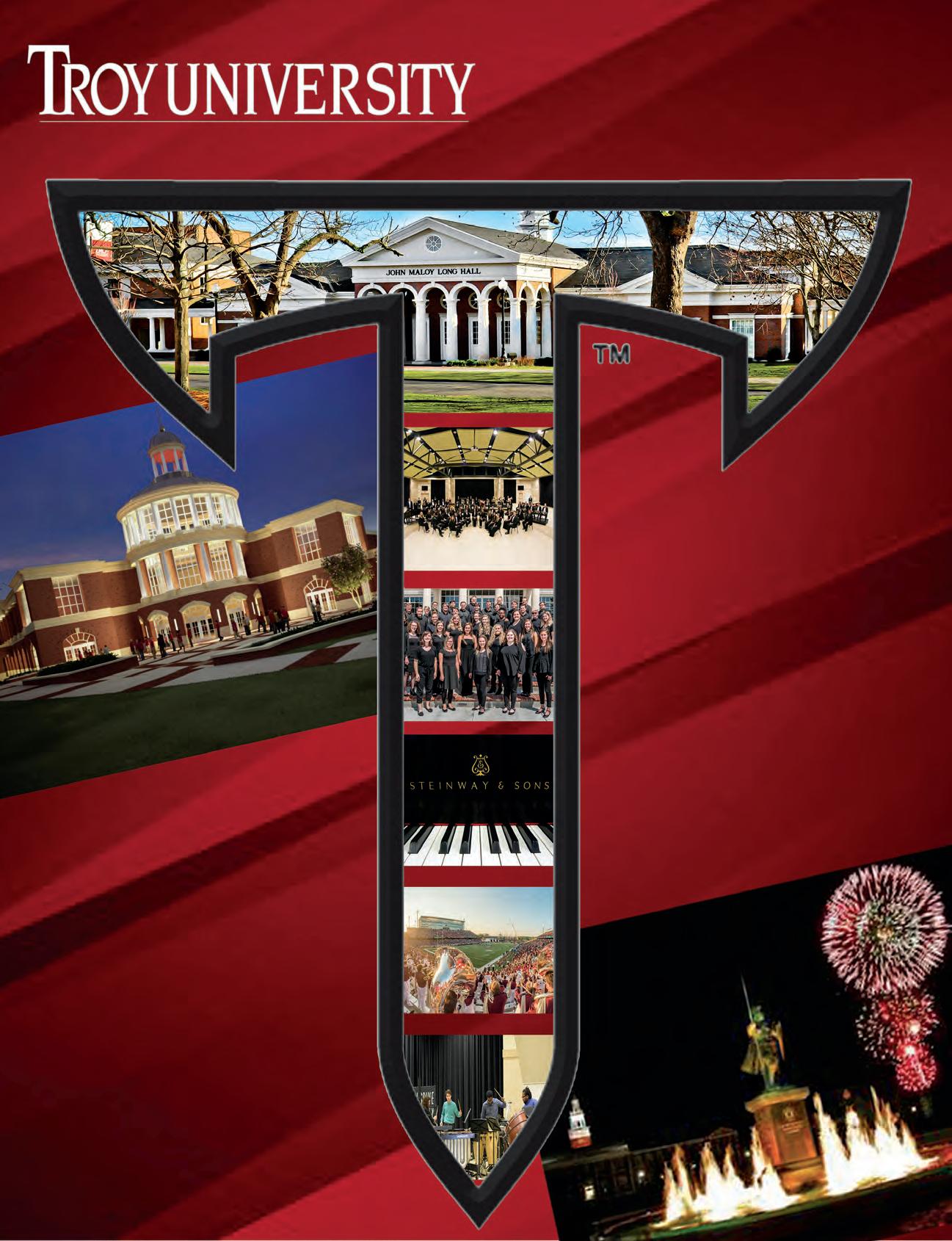






AMEA Governing Board 2018-2019
President Greg Gumina Shades Valley High School 6100 Old Leeds Road Irondale, AL 35210 (205) 956-4638


ggumina85@gmail.com
Immediate Past President
Susan Smith 104 Smith Hall Troy, AL 36082 (334) 670-3322



ssmith26024@troy.edu
President, AOA
Guy Harrison 218 Goodwin Music Building Auburn University, AL 36849 (334) 844-8192

gfh0002@auburn.edu
President, AMEA Collegiate
DeLee Benton
dbenton@forum.montevallo.edu
Industry Representative Becky Lightfoot Arts Music Shop 3030 East Blvd Montgomery, AL 36116 334/271-2787

beckyl@artsmusicshop com
Executive Director
Editor, Ala Breve Garry Taylor 1600 Manor Dr NE Cullman, AL 35055 (256) 636-2754




amea@bellsouth.net
President-Elect
David Raney Sparkman High School 2616 Jeff Road Harvest, AL 35749 256-837-0331 draney@madison.k12.al.us

Recording Secretary
Carla Gallahan
113 Long Hall Troy University Troy, AL 36082 (334) 670-3502 recording_secretary@myamea.org
President, AVA
Megan Jones Decatur High School 1011 Prospect Drive Decatur, AL 35601 (256) 552- 3011 presidentofava@gmail.com
AMEA Collegiate Advisor
Edward (Ted) Hoffman University of Montevallo Station 6670 Davis Music Building 308 Montevallo, AL 35115 (205) 665-6668 ehoffman@montevallo.edu
Assistant Executive Director Rusty Logan 2020 Janabrooke Lane Auburn, AL 36830 (334) 663-1702 rlogan9853@gmail.com
Treasurer/Registrar
Pat Stegall
AMEA Registration
PO Box 3385



Muscle Shoals, AL 35661
treasurer_registrar@myamea.org
President, ABA
Doug Farris Brewer High School 59 Eva Road Somerville, AL 35670 (256) 621-0540
djfarris@morgank12.org
President, Elem/Gen







Phil Wilson Ogletree Elementary School 737 Ogletree Road Auburn, AL 36830 prwilson@auburnschools.org
President, Higher Education
Mildred Lanier Jefferson State Community College (205) 983-5309

mlanier@jeffersonstate.edu
Alabama Department of Education Arts Education Specialist Andy Meadows 50 North Ripley Street Montgomery, Alabama 36104 (334) 353-1191

ameadows@ALSDE.edu
Garry Taylor, Editor & Advertising Manager 1600 Manor Dr NE Cullman, AL 35055 (256) 636-2754




executive_director@bellsouth net
ADVERTISING & COPY DEADLINES
Fall - August/September (Back to School) issue: July 15
Winter - October/November (Conference) issue: September 15
Spring - May/June (All-State) issue: January 15
Summer - May/June (Digital Only)
Unless otherwise indicated, permission is granted to NAfME members to reprint articles for educational purposes. Opinions expressed in this publication are not necessarily those of AMEA or the Editor. All announcements & submissions are subject to editorial judgement/revision.The Alabama Music Educators Association is a state unit of NAfME: The National Association for Music Education, a voluntary, nonprofit organization representing all phases of music education in schools, colleges, universities, and teacher-education institutions. Active NAfME/AMEA membership is open to all persons engaged in music teaching or other music education work.
Ala Breve is published four times a year
and
by Hardwick and Son Printing in Dothan, Alabama. Subscription for members is $4.00 per year as part of annual NAfME/AMEA dues. Subscriptions for non-members is $15.00 per year. Bulk rate postage paid at Dothan, Alabama.
(August, October, February & May) by the Alabama Music Educators Association
printed
issue: April 15
AlabamaM OfficialPublicationof ala b breve g ndC n A A n AVA MusicEducatorsAssociation b ua Ma h2 S S du ngC Aw d M u W o M C W A G Q %R R T DD C h 2019G m ? d D ? G T a c .myam
ala breve 7
Cover Photo: Big Stock Photo
Hello AMEA!

Sometimes it’s beneficial to take a step away from the daily realities of being in the classroom in order to recharge and reset our appreciation of music, and possibly our daily teaching practices. Conferences, committee work, and other professional development opportunities are the perfect vehicles for us to accomplish that recharging and resetting process. Ryan Lilly, an expert in the field of business development, advises to “Be a Professional at what you do. No one shows up to meetings of the Unsuccessful Skydivers Club.” And Amit Kalantri, an engineer and author, addresses the subject by stating that, “Professionalism is not a tactic, but a moral value.” The entire community that comprises the AMEA certainly lived up to these goals and morals with your participation in our 2019 Professional Development Conference.

Wow! What a great conference we had in Birmingham. I am so proud of our entire organization for putting together such a wonderful professional developmentopportunityand thank you so much for your attendance. The numbers are in, and it was by far the secondlargestAMEAConferenceinour history. One thousand and three members were registered, and exactly one thousand attended, plus a good amount of guests as well. That is clear evidence of your commitment to our profession and our students. There are so many people to thank and so many people to congratulate that I could fill this entire issue of the Ala Breve if that was possible.
ThefirstpeopleIwouldliketothankare two gentlemenwithoutwhich, we would have no conference. Thank you, Ron Bearden and James Champion for everything you do for the AMEA. You are very much appreciated and your
tireless efforts have not gone unnoticed. Thanks also to President-Elect David Raney and Immediate Past-President Susan Smith for all of their help, guidance, and leadership. Susan also did a wonderful job with our FAME students and their sessions. Next is the staff of the AMEA, and there are not adequate words or space in this article to accurately express their importance to us. Garry Taylor, Rusty Logan, Carl Hancock, and Pat Stegall are all amazing professionals and truly dedicated to our organization. They work all year long to guarantee the success of our conference. Thanks also to our vendors and exhibitors for supporting the AMEA, and I would also like to thank the membership for visiting them. Revenue from the exhibition hall was once again up this year, which helps pay for the conference. Traffic through the exhibits was also up this year, and our exhibitors appreciated seeing all of you at their booths. A healthy relationship between us educators and our industry partners is both beneficial and necessary. Thanks to Becky Lightfoot for serving as our Industry Representative, and for representing our partners with such dignity and sincerity.

8 February/March 2019
Greg
Gumina, AMEA President
Be a professional at what you do.
No one shows up to meetings of the Unsuccessful Skydivers Club.
The Governing Board assembled a fabulous experience, full of diverse and useful learning opportunities. We had wonderful concerts, informative interest sessions, and many occasions for collaboration with colleagues. Thank you so much to: Doug Farris (ABA), Guy Harrison (AOA), Meg Jones (AVA), Phil Wilson (Elementary/General), Mildred Lanier (Higher Ed), Ted Hoffman (Collegiate Advisor), and Jordan Hare Banks (Collegiate) for everything you did to make our conference such a wonderful experience. Also thanks to Kim Bain and the Jazz Division for doing such an awesome job with our All-State Jazz Bands and Randall Coleman along with those that helped facilitate the outstanding Intercollegiate Band. I would also like to thank Carla Gallahan for always making sure we have accurate documentation for our activities, and for ensuring the correct operation of our various endeavors. I am so honored to have the opportunity to work with the consummate professionals who comprise the AMEA Governing Board. They represent you well, work diligently for our organization, and should be commended for their dedication to music education in Alabama.
To apply for, prepare, and present a performance for one’s colleagues is a very rewarding experience, and is not without challenges to overcome. So a sincere ‘Thanks’ and ‘Congratulations’ goes out to all of our colleagues who presented concerts for us to be inspired by and enjoy. Thanks also to those who presented interest sessions full of information which both enriched us personally, and nourished our profession.
Our special guests were amazing, intuitive, informative, and entertaining. Dian Eddleman, our NAfME Southern Division President was fantastic in all the sessions we asked her to do. She brought a wealth of knowledge and information to us and worked purposefully to present targeted data, findings, and communication to various groups throughout her stay with us. Andy Meadows, our ALSDE Arts Education
Specialist, also brought information, concern, and communication while visiting several meetings and sessions during his time with us. It is indeed profitable and beneficial to have an open line of communication and mutual understanding with our state officials in Montgomery. Dr. Tim Lautzenheiser was the one and only, as only he can be. He is always uplifting, rejuvenating, inspiring, encouraging, and motivating. He is without equal as the preeminent music education speaker and advocate in our country. And to everybody else who contributed in any way to the success of our conference, thank you very much.
The AMEA Governing Board is already working on next year’s conference and I am confident that we will again have a wonderful experience. But this time, we’re going back in Montgomery! Now is the time to decide to participate in next year’s
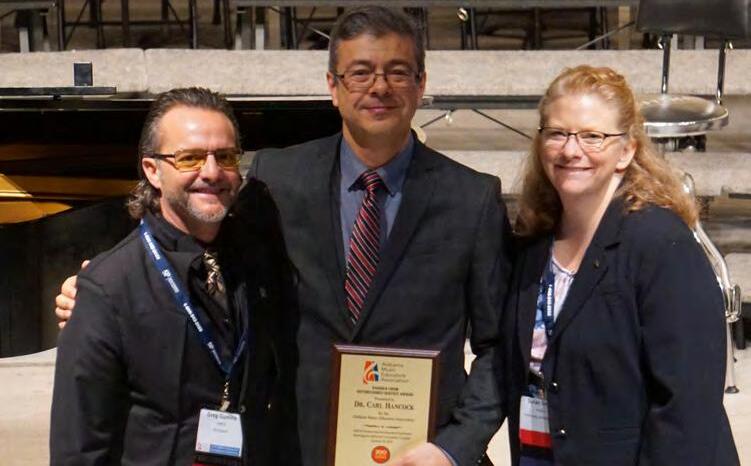
conference. Make a commitment to apply for a performance opportunity. Create chamber groups at your school and apply for a lobby performance. We have so many talented professionals in this state with so much knowledge to share with each other. Decide now to apply to present a session on the topic you have intimate knowledge of and are passionate about. Or, if there is something you are studying and gaining understanding about, decide now to finish your research and present it at our conference next year. Together, we all make the AMEA a powerful force for the betterment of our profession and to the benefit our students. Let’s have a great 2019, and best wishes to all.
Music Education is Awesome in Alabama!
Respectfully Submitted,
Greg Gumina
I will be honest, FAME provided a completely different perspective on music education. I think it’s extremely underrated ...
Students learn more than just music education and for those who maybe just want a taste of what the world of music education and a career in music in general is like should be encouraged to go.
If there are any students questioning what they want to pursue in life, this program is ideal for that. It really is a change of perspective that can be a really good force of good!
ala breve 9
Chandler Ogle, Corner High School, 2019 FAME Participant
AMEA President Greg Gumina (L) and Immediate Past President Susan Smith (R) congratulate Distinguished Service Award Recipient Dr. Carl Hancock. See page 25 for all awards and recognition.
Strike up the… Orchestra!
What a wonderful AMEA Conference! As physically exhausting as these conferences can be, I for one, am feeling professionally refreshed and primed for the year ahead. The AOA made a point to sponsor sessions that not only spoke to our membership directly but also touched on topics that are relevant to all music educators, both seasoned and novice alike. Our headline clinician, Bob Phillips (Alfred Music), was inspirational with his sessions on beginning strings, the art and science of motivation, and his session on transforming the tone of your ensemble. We were also fortunate to have Dr. Jason Sulliman (Troy University) inform us about the importance of wellness and injury prevention and Dr. Anne Witt (University of Alabama) discuss classroom management strategies. Joe Brennan (Haverford High School, PA) joined us again this year with tips on how to improve ensemble skills and Dr. Thomas Brough focused his attention on our pre-service teachers with tips and advice on things young educators need to know. Finally, our colleagues at the University of North Alabama – Dr. Tracy Wiggins, Dr. Meghan Merciers, Sam Merciers, and Dr. Whitney O’Neal joined us for an early session on Saturday morning on teaching improvisation in the ensemble setting. It was a great way to end the conference!
I would also like to take this opportunity to thank Greg Gumina for providing the opportunity for the Alabama Symphony Youth Orchestra to perform at the Keynote address. Greg’s support of the AOA is very much appreciated. Having the ASYO perform highlighted the wonderful opportunities that could exist for ALL of our students with the establishment, growth and strengthening of string programs around our state. I encourage everyone to seek out those
students that are not participating in your school music programs because they don’t have an ensemble to join and consider advocating for those students with your local school boards. The AOA is here to assist in any way we can to help give those students the same opportunities as their peers in band, choir and other school-based arts programs.
A big shout out also has to the go to the Alabama School of Fine Arts String Ensemble for their lobby performance. Directed by Kim Strickland the ensemble played an eclectic program that was very well received by those that attended. The AOA would like to encourage more of our state string/orchestra programs to consider applying to perform in 2020!
By the time this edition of Ala Breve arrives in your mailbox or inbox the AOA will have concluded its annual All-State Orchestra Festival. We would like to thank the University of Alabama for once again hosting the festival! As in previous years the AOA held a Composition Contest with the winning piece receiving its premier performance by the Festival Orchestra. This year we will feature Discord by Nabil Abad. Mr. Abad’s work was chosen from more than 30 entries from all over the world. In case you missed it in a previous issue, our clinicians this year are Dr. Raphael Jimenez, Director of Orchestras at Oberlin College, Mr. Bryan Buffaloe, Director of Orchestras at Clear Lake High School (Houston, TX), and Dr. Gail Barnes (University of South Carolina), Professor of Music Education and Director of the USC String Project. We are excited to have such a talented line up of conductors to work with our students! I also need to take this opportunity to thank the members of the AOA Board for all their hard work in bringing our All-
State festival to fruition. Without such a great team effort we would not be able to put forth this opportunity for the students in our state. I would also like to thank all of our District Chairs for their work in recruiting students and running the auditions for this year’s festival.
Last, but not least, the AOA will be hosting our 4th Music Performance Assessment event on April 5 at Gadsden City High School. I would like to thank Keith LaBenne and the Gadsden City High School administration for their willingness to host us this year. More information about the event can be found on our website –www.alabamaorchestraassociation.org
I hope that your year is filled with great music making, student success, and professional satisfaction. Please reach out and let us know how the AOA can better serve you and your students. I look forward to seeing you at one of our remaining spring events.
Regards,
Guy Harrison President

Alabama Orchestra Association

Important Spring Dates:
Registration Deadline for MPA –Orchestra: March 1
MPA – Orchestra Event: Friday April 5
Gadsden City High School
10 February/March 2019
Guy Harrison- President, Alabama Orchestra Association

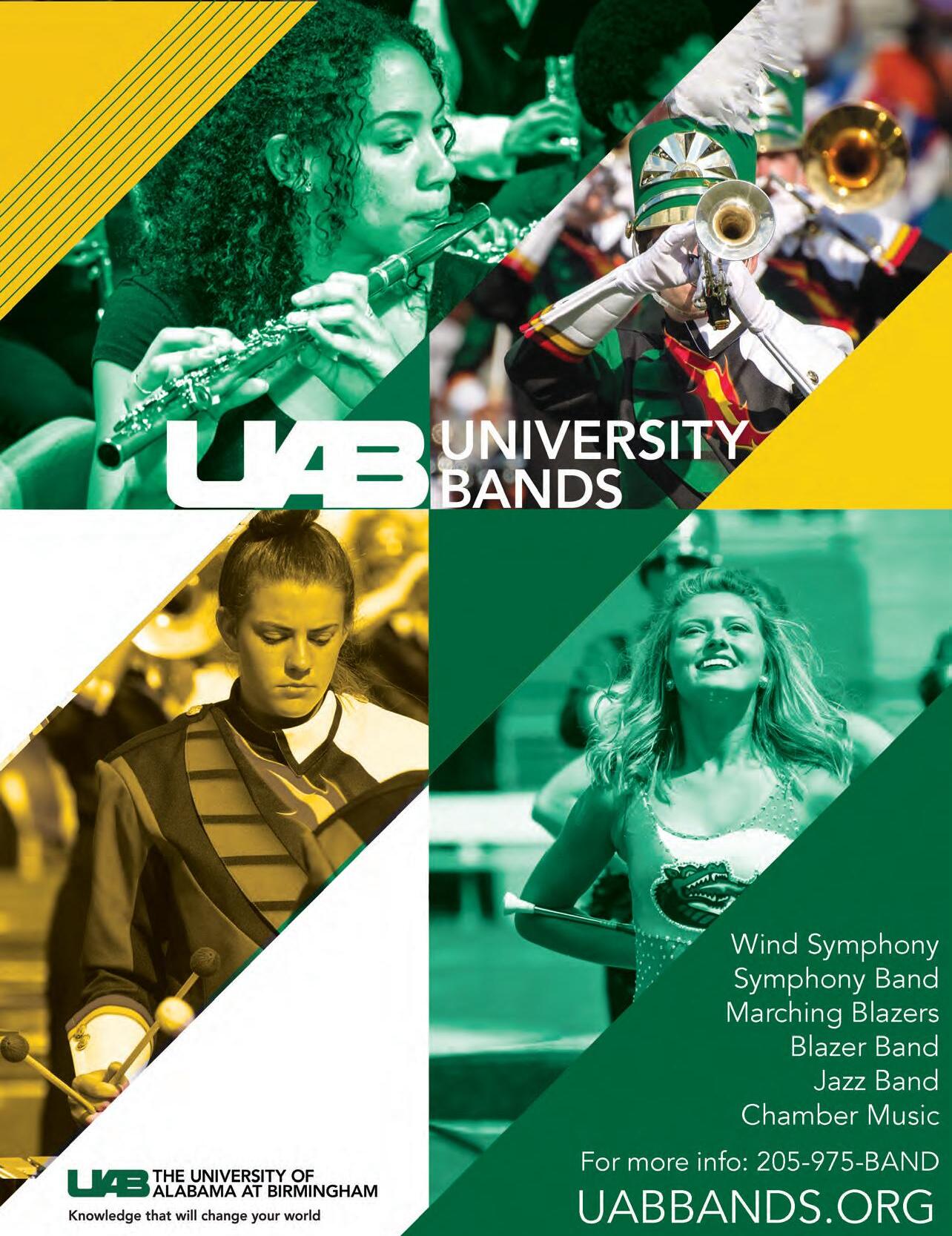
Mildred Lanier - President, Higher Education Division
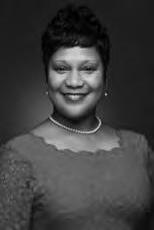
Dynamic, stimulating, challenging, and exciting are words that describe the atmosphere, performances, and academic discourse that took place at the 2019 AMEA Professional Development Conference. There was something to satisfy everyone’s intellectual and artistic interest. And it was only possible because of the wonderful student and faculty performances, expert presenters and panelists, research presentations, and memorable keynote speaker.
When I attend the AMEA conferences, I always come away renewed and so proud of our profession, and I was not disappointed this year. The commitment of faculty to expose young people to the beauty and complexity of music and prepare and stretch future music educators did not go unnoticed. As faculty at colleges and universities, our continued collaboration and support of one another was on display throughout the conference. That unity created beautiful harmony and teamwork. Thank you for all you do to make our HED Division progressive and strong.
1946 Yale H . Ellis
Now what’s next? The AMEA Board and HED Officers are anticipating the 2020 Conference in Montgomery, Alabama. The opportunity to perform, bring your ensemble, or be a presenter or presider is available. No, it’s not too soon to begin thinking about how you can get involved. Go ahead and begin thinking about a presentation topic that you might want to submit. Go ahead and visualize your ensemble performing on stage. We want to make the 2020 conference bigger and better and we need “you.”
As you settle into the spring semester, I hope that the love you have for music continues to stir your passion to new heights. If you have comments, suggestions, or questions, please don’t hesitate to contact me at (mlanier@jeffersonstate.edu).
AMEA Presidents - Past to Present
1972 Frances P. Moss
1996 Johnnie Vinson
1948 Walter A . Mason
1950 Vernon Skoog
1952 John J. Hoover
1954 Lamar Triplett
1956 Carleton K . Butler
1958 Mort Glosser

1960 Wilbur Hinton
1962 Lacey Powell , Jr .
1964 G. Truman Welch
1966 Jerry Countryman
1968 Floyd C . McClure
1970 Jerry Bobo
1974 George Hammett
1975 Frances P. Moss
1976 S . J. Allen
1978 W. Frank McArthur
1980 Paul Hall
1982 Lacey Powell , Jr .
1984 Johnny Jacobs
1986 Merilyn Jones
1988 Ronald D. Hooten
1990 Ken Williams
1992 Dianne Johnson
1994 James K . Simpson
1998 Michael Meeks
2000 John McAphee , Jr .
2002 Tony Pike
2004 Becky Rodgers
2006 John Baker
2008 Pat Stegall
2010 Steve McLendon
2012 Sara Womack
2014 Carl Hancock
2016 Susan Smith
2018 Greg Gumina
ala breve 13
General Music Reviews
This is not your average collection of worksheets.

The real value of this book is that it follows a natural Kodály sequence. The lessons in this book build upon the previously taught concept and is developmentally appropriate for grades Kindergarten and First Grade.
Music Makers is reproducible. Each page can be viewed, sung, tapped, drawn on, and danced by your students to explore music at a higher level than a traditional worksheet.
Music Makers comes with a teacher’s PDF edition that explains each lesson and a printed workbook that can be used for scanning or copying. The activities are listed by concepts: steady beat, ta, ti-ti, so mi, ta-rest, la, etc…
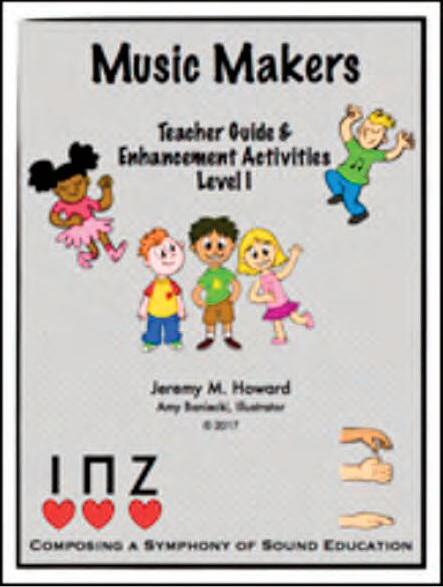

My favorite part of the book is the mystery song collection in
the back. The kids can participate in a “Name That Tune” assessment. This is the best lesson I have seen for early childhood ear training.
For more information about this book follow Music Makers on Facebook. To learn more about Kodály, join us for a free workshop at my school: April 6, 2019, from 9-3 at Vestavia Hills Elementary East. Kodály Levels I, II, and III will be held at St. Luke’s Episcopal Church July 8-19 through the University of Montevallo. The author of this book, Jeremy Howard will be one of the instructors for the course.

I hope that others will enjoy this book as much as I have! Best wishes for an amazing school year!
Deanna Bell
14 February/March 2019
Learning Together Makes Us Better
Fred Rogers, creator and host of Mr. Roger’s Neighborhood once said,” Imagining something may be the first step in making it happen, but it takes the real time and real efforts of real people to learn things, make things, turn thoughts into deeds or visions into inventions.” This, my friends, is exactly what WE did! During the 2019 AMEA Professional Development Conference we learned new things, made music, thought deeply about things and hopefully, when you returned to your schools, turned those thoughts into new exciting experiences for your students. We were inspired to use music as a vehicle to make our neighborhoods a better place and learned how to play rhythms on yoga balls. We celebrated Alabama’s birthday, strummed guitars, learned how to record our students and even how to put on a show. Beth Ann Hepburn challenged us with new and innovative activities while also touching on some traditional ones as well. We composed, weaved our way through music classes through creative planning, and transitioning and explored ways to engage hard to reach students. All of this, and much much more, happened in just three days. WHEW!
Thorpe (2014) stated,” Within the United States and across nations, there seems to be consensus that teacher quality is the most important school-based variable in determining how well a child learns” (Thorpe, 2014, p. 1). Barrett (2010) says the key to improving teacher quality, and improving student learning, is for teachers to engage in professional development. In study after study, researchers agree that participating in professional development activities improves teacher quality which in turn elevates student’s learning. Continue to renew and refresh yourself by participating in quality professional learning opportunities throughout the year. Our students deserve it!

During our business meeting, we elected the 2019-2021 Elementary/General Division Executive Board:
President: Betty Wilson
President-Elect: Sarah McLendon
Treasurer: Lori Zachary
Secretary: Rob Lyda
Hospitality: Kristi Howze
Past-President: Phil Wilson

Festival Director: Melissa McIntyre
As you continue to create and develop new exciting lessons in your classrooms, consider sharing those ideas at our 2020 AMEA Professional Development Conference which will take place in Montgomery. Speaking of Montgomery, we will also be moving our Elementary Music Festival to Eastmont Baptist Church in Montgomery. Our new festival director Melissa McIntyre, and the festival committee, has already been hard at work planning the festival and Fall workshop More details to come.
Thank you for all that you do to make our musical neighborhoods better places. As always, if you have questions or concerns, please contact us through the division email at elementaryAMEA@gmail.com. Remember to follow and post pictures and videos of things you are doing in your classrooms on our AMEA Elementary Facebook group page.
Thorpe, R. (2014). Sustaining the teaching profession. New England Journal of Public Policy, 26(1), 5.
Upcoming Events
ALABAMA CHAPTER OF AOSA SPRING WORKSHOP
March 2, 9 a.m.-3 p.m.
Lorelei Batislaong
Vestavia Hills United Methodist Church
Sweet Home Alabama Kodály Educators (SHAKE) Free Spring Workshop
Dr. Michele Paise
April 6, 2019, Vestavia Hills Elementary East, 9-3
2019 Young Voices Festival
April 26-27, 2019
University of Alabama
Contact: meredithcdevore@gmail.com
World Music Drumming Level I
Crestline Elementary, Hartselle
June 3-7, 2019
Contact: gregory.pearcy@hartselletigers.org
Orff Level II and III
Samford University
June 17-28, 2019
Contact: lhardin@samford.edu
Kodály Levels I, II & III
University of Montevallo
July 8-19, 2019
Saint Luke’s Episcopal Church in Mountain Brook
Contact: ahalliday@montevallo.edu
East Alabama Music Workshop
Grace United Methodist Church, Auburn
August 24, 2019
Contact: lydarob@me.com
Elementary Music Festival
Eastmont Baptist Church, Montgomery
October 18, 2019
Clinician: Dr. Madeline Bridges, Belmont University
Clinician: Dr. Becky Halliday, University of Montevallo
Contact: mcintyrem@vestavia.k12.al.us
ala breve 15
Phil Wilson - President, Elementary/General Division
AN AMEA CONFERENCE FOR THE RECORD BOOKS!
AN AMEA CONFERENCE FOR THE RECORD BOOKS!
This year’s conference was outstanding with so many opportunities for professional development. Wednesday began with the AMEA board and ABA board meeting to finalize the conference and planning for the future. Thursday’s concert schedule was a great view into the instrumental education in Alabama. The day started on a spectacular note with the Liberty Park 7th & 8th Middle School Band and Oak Mountain High School Symphonic Band. The concerts from Muscle Shoals High School Wind Ensemble and Thompson High School Wind Ensemble were both amazing glimpses into what our bands can achieve. The night continued with the UAB Wind Symphony which was outstanding. A new event with the 10 pm concert featured the Alabama Winds. Their concert included “In My Father’s Eyes” by Julie Giroux. It is dedicated to the 1963 bombing victims of the 16th Street Baptist Church. It featured the choir from the 16th St. Baptist Church. It was a moment none of us will soon forget. Friday’s concerts with Fairhope Middle School Symphonic Band and Spain Park High Symphonic Winds were equally as great. Thanks to these directors and students for your hard work and dedication to your programs. So many of the clinics were done by our own members. Many thanks to all the clinicians for sharing your wonderful talents. As you begin preparing for MPA consider applying to perform next year. We have great bands in this state at all levels. Bite the bullet and apply to perform.
As we have just finished all districts all-state auditions, we must learn the process to benefit our students. For any ABA event, read the handbook on that section. The most recent edition can be found on myamea.org. When you don’t prepare, it’s your students that suffer. It also causes stress on the chairmen and people organizing the event.
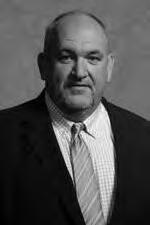
MPA is our next event. As you prepare, remember everyone cannot perform at 11:00 am on the last day. Be flexible and cooperate so when the adjudication starts it is as stress-free as it can be.
An educational festival for elementary, middle, and high school students in band, choir, and orchestra
2019 dates:
April 12
April 26
May 3
2020 dates:
April 3
April 7
April 24
www.SMMFestival.com or call:1-855-766-3008
The solo festival will register online this year. The link will be emailed and posted on the abafest.com website. Fill out all information and print the last page of the receipt email. The band director, student, and parent must sign this page before mailing with payment to Harry McAfee.
Directors are so passionate about their students. When we are involved in ABA events they are all our students.
Everyone deserves our full professional attention.
At All-State we will discuss and vote on the following legislation:
2019-1

Currently:
Article XVI, Section 3
c. No electronic instruments may be used unless included in the score by the composer. Any other exceptions to must be presented to the Chairman of the Music Selection Committee (Vice-President) for approval.
Change to/Add:
Article XVI, Section 3
Electronic instruments may be used if they are included in the score by the composer or with approval from the Chairman of the Music Selection Committee (Vice President). An electronic piano and necessary hardware, provided by the band performing, will be allowed to be used to substitute for a piano part that is included in the score by the composer.
Rationale:
There are many publications that require a piano part. This change to the bylaws will allow directors to choose to perform on an acoustic piano (if available) or an electronic piano. The main advantages to the electronic piano are the student can prepare for assessment on the instrument they will perform on and you can ensure that it is in tune
2019-2
Article XX. Non-Traditional Students
This article outlines the process to allow non-traditional students to participate in a band with Alabama Bandmaster Association member public schools. The guidelines below outline participation for all activities sponsored by the Alabama Bandmasters Association.
Section 1. Home School Guidelines
a. Enrollment
1) Students must enroll in a member public school in order to participate in a band performance or practice.
2) Must be enrolled at the member public school that serves the area in which the student’s guardians reside.
3) Must be enrolled within the first 20 days of the semester in the school they are zoned to attend.
4) All home school students are eligible once enrolled based on local board policy.
b. Academic Accountability
1) Must be enrolled and attend two electives offered by the school.
i. One of these electives is required to be the band class the student participates with at performances.
ii. The other elective class can be taken on campus or through the school ’s virtual program.
iii. The ABA recommends that the other elective is not an additional band class or private lessons class.
16 February/March 2019
Doug Farris - President, Alabama Bandmasters Association
c. Practice Time
1) A home school student’s practice time must be equivalent to but not to exceed that of a traditional student during the school day.
Section 2. Virtual School Guidelines
a. Enrollment
1) Virtual school students must follow all ALSDE policies.
2) Local board policy must be in accordance will all ABA bylaws.
b. Academic Accountability
1) The student must be enrolled and attend the band class the student participates with at performances.
c. Practice Time:
1) A home school student’s practice time must be equivalent to but not to exceed that of a traditional student during the school day.
Section 3. Charter School Guidelines
a. Enrollment
1) Alabama public charter school students must enroll within the first 20 days of the semester in the school they are zoned to attend.
2) For eligibility in an Alabama public charter school, enrollment must be at the public charter school that serves the area in which the student’s parents reside and all other requirements are met.









3) If a public charter school (conversion or start up) does not have band, the student may return to his/her home school (based on the student’s residence) to participate.
b. Academic Accountability
1) The student must be enrolled and attend the band class the student participates with at performances.









c. Practice Time:
1) A home school student’s practice time must be equivalent to but not to exceed that of a traditional student during the school day.
Mentioned in Article XI, Section 1, Letter g (pg. 9) - All-State Auditions, & Article XVI, Section 3, Letter h (pg. 16) - MPA
1) Only students who are enrolled in their high school, junior high school, or middle school band are eligible to participate in the Alabama Bandmasters Music Performance Assessment.


2) Students who are being home schooled under guidelines established by the State Department of Education may participate in the Alabama Bandmasters Music Performance Assessments as long as they meet the following prerequisite: Membership in an instrumental ensemble that meets on a regular basis to rehearse and perform traditional band literature, whose conductor meets all membership requirements of the Alabama Bandmasters Association.
At All-state this year, we will have elections for Jazz President-Elect, Recording Secretary, and ABA President-Elect. The nominating committee is Chris Lindley from Albertville High School, David Caddell from Echols Middle School, and Will Mixon from Gulf Shores High School. If you have recommendations, please contact them. The organization needs the best person for these positions.
Lastly, abafest.com in its current form will end July 31st. Please watch for instructions, go to district meetings and read emails. “I don’t know” can’t be an excuse. Do we accept that from our students? Let’s be professional and remember we are band directors and can make magic out of situations that possibly could not succeed. Good Luck at MPA and we will see you in Huntsville for All-State.
THREE SUMMERS:

ala breve 17
Instrumental Elementary Choral
A MME at MSU C olle g e o f Educatio n TE UNIVERSIT AT T I O MU S I C EDU C MISSISSIPPI ST MASTER OF ®TY N / MME .MU S WWW TE.EDU A IC.MSST Courses of Summer and Online Complete the MME with a Combinatio
THREESUMMERS:
THREE TRACKS:
on
2019 ABA All-State Schedule - April 24-27, 2019
April 24, 2019 Solo Festival – UAH Roberts Hall
April 25, 2019 –Director’s Meeting and All State Auditions First Baptist Church Huntsville
April 25-27, 2019 All State Band Festival, Von Braun Center, Huntsville, AL
Wednesday, April 24 Solo Festival, University of Alabama at Huntsville
Thursday, April 25 - All-State Auditions and Meetings
East Hall 2 1:00-7:00 P. M. Exhibits Open (Directors visit our event sponsors)
Chapel FBC Huntsville 12:00-12:45 P. M. Director’s meeting (all directors must attend)
Parlor 1:00-5:30 P. M. Tabulation room (assigned personnel only)
Lifecenter & Fellowship Hall
ALL-STATE BAND REHEARSALS 6:30-9:30 P. M.
East Hall 1 Red Band
East Hall 3 White Band
North Hall 3 Blue Band
North Hall 1 Middle School Band
North Hall Salon 1 ABA Executive Board meeting (7:00-9:00 P. M.)
CURFEW FOR ALL PARTICIPANTS-11:00 P. M.
Audition results will be posted at the entrance to each band’s rehearsal location immediately following the chair placement auditions.
Friday, April 26 - All-State Band Rehearsals
CURFEW FOR ALL PARTICIPANTS-11:00 P. M.
Saturday, April 27 - All-State Band Rehearsals VBC Propst Arena
VBC Propst Arena
8:00-8:45 A. M. Middle School Rehearsal
8:45-9:30 A. M. Blue Band Rehearsal 9:30-10:15 A. M. White Band Rehearsal
A. M. Red Band Rehearsal Von Braun Center
Hall Salon 1
A. M. ABA Board Meeting (Directors-please remain outside until the board meeting has concluded)
Hall Salon 1 9:45-10:45 A.M. ABA General Business Meeting
VBC Propst Arena
1:00 pm – 3:00 pm All-State Band Festival Concert (All Bands)
18 February/March 2019
Preliminary Competition 9:00 A.M. -5:00 P.M. State
Festival Finals Concert 7:30 P.M. Band Hosts Meeting 9:00 P.M.
Solo Festival Check in 8:00 A.M.
Solo
2:00-5:00
P. M. Warm-Up
East
12:00-5:30 P.M. EXHIBITS OPEN ALL-STATE BAND REHEARSALS East Hall 1 Red Band 8:30A.M.-12:00 PM East Hall 3 White Band 8:30A.M.-12:00 PM North Hall 3 Blue Band 8:15 A.M.-11:45 A.M. North Hall 1 Middle School Band 8:15 A.M.-11:45 A.M. North Hall Salon 3 9:00-10:30 A. M. ABA General Business meeting North Hall Salon 3 10:30-11:30 A. M. How to REALLY Succeed at MPA: An Adjudicator’s Perspective South Hall Ballroom 1 12:00-1:00 P. M. Phi Beta Mu Luncheon North Hall 2 11:45 A.M.-1:30 P. M. Lunch for participating students North Hall Salon 3 1:30-2:30 P. M. Andy Nevala Jazz Clinic TBA 3:30-4:30 P. M. MPA
Hall 2 8:30-11:30 A. M. and
Adjudicators committee meeting University of Alabama at Huntsville Wind Ensemble Concert - VBC Concert Hall 8:30-9:30 P.M
10:15-11:00
North
North
9:00-9:30
Red Band
Dr. Cynthia Johnston Turner is Director of Bands, Professor of Music, and Artistic Director of Rote Hund Muzik at the Hodgson School of Music, University of Georgia. Turner conducts the Hodgson Wind Ensemble, leads the MM and DMA programs in conducting, and oversees the entire band program including the 430-member Redcoat Marching Band. She is "VIP Educational Clinician" with Conn-Selmer. Before her appointment at the Hodgson School at the University of Georgia, Cynthia was Director of Wind Ensembles at Cornell University. Earlier in her career, Cynthia was a high school music educator, taught middle school beginning instrumental music in Toronto and choral music in Switzerland. A Canadian, Cynthia completed her Bachelor of Music and Bachelor of Education degrees at Queens University and her Master of Music in music education and conducting at the University of Victoria. Cynthia has commissioned numerous new works for wind band, contemporary music ensembles, and orchestra, and she continues to actively promote commissions by today’s leading and emerging composers around the world. Under her direction, the Cornell Wind Ensemble was invited to perform at the College Band Directors National Association’s Eastern Division Conference in 2007 and 2012, and the Hodgson Wind Ensemble performed at CBDNA National in Kansas City in 2017. In 2008, the Merrill Presidential Scholars at Cornell recognized Cynthia as an outstanding educator, and in 2009, she was awarded the Kaplan Family Distinguished Faculty Fellowship.
White Band
Dr. Catherine Rand comes to Southern Miss from her position as Director of Bands and Area Coordinator of Winds and Percussion at Florida International University, where she conducted the Wind Ensemble, Chamber Winds, and taught wind literature and graduate conducting. A native Floridian, Rand received her Bachelor of Music Education from the University of Tampa, Master of Music degree in conducting from the University of South Florida, and Doctor of Musical Arts in wind conducting from the University of Miami’s Frost School of Music. Prior to her collegiate teaching career, Dr. Rand taught band and orchestra for 14 years in the Florida public school system. Active in scholarly and creative endeavors, Dr. Rand has presented numerous workshops to music educators on festival preparation, FCAT Testing and rehearsal techniques. She recently presented her research “Balancing Artistry and Education” in Austria, and conducted the
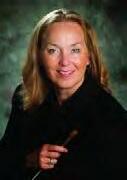
2019 All-State Band Clinicians
Minnesota All-State Band, and the Florida AllState Honor Band. Dr. Rand has been a member of the Creative Music Project, held for the past two years in the Cayman Islands, promoting student-based musical creativity by providing improvisation and composition activities accompanied by technology-based, multidisciplinary methodology. She and the FIU Marching Band were invited to the Bahamas to perform in their independence celebration. She is published in volume 5 of “A Composer’s Insight: Thoughts, Analysis and Commentary on Contemporary Masterpieces for Wind Band.” Dr. Rand maintains an active schedule as a guest conductor, clinician, adjudicator, and guest lecturer throughout the United States and abroad. Her professional affiliations include the College Band Director’s National Association, College Music Society, Women Band Director’s Association and the Music Educators National Conference.
Blue Band
Dr. Dennis Llinás is the Associate Director of Bands at Louisiana State University. His responsibilities include conducting the LSU Symphonic Winds, teaching undergraduate conducting, directing the LSU Bengal Brass Basketball Band, and assisting with the LSU Tiger Marching Band. From 2003 to 2007, Llinás was director of bands at Miami Coral Park Senior High School where he conducted the concert ensembles, directed the jazz program, marching band, and the percussion ensemble. From 2007 to 2008, he was the assistant director at W. Charles Akins High School in Austin, TX. His responsibilities included directing the percussion ensemble, providing private lessons to the percussion studio, conductor of the Concert Band, assistant conductor of the Wind Ensemble, and director of the Jazz Band. In the world of marching arts, Llinás is an active arranger/composer/show designer producing competitive marching band and indoor percussion shows for over 50 programs across the nation. Several of his works have been published by Center X Productions and performances of his works could be heard throughout the country including Oklahoma State University, Winthrop University, and The University of Texas at Austin. Several special projects have been commissioned of him by Estefan Enterprises in Miami, FL for the Miami Dolphins and the Florida Marlins, as well as the 2007 Orange Bowl Halftime Production with special guest star from American Idol Taylor Hicks. As a composer, Llinás has been commissioned to compose works for musicians from across the country. Recently, two works have been recorded by Mark Hetzler, trombone professor at The University of Wisconsin, on Summit Records on two separate albums in 2012. His compositions and arrangements have also been performed by The University of Texas Wind

Ensemble, The University of Texas Men’s and Women’s Chorus, the Dallas Wind Symphony, as well as performances by solo artists from The University of Texas, Furman University, and Huston-Tillotson University. Llinás is an active clinician and guest conductor in the United States. In 2012, he appeared as a guest conductor with the West Point Band conducting music by Michael Daugherty. He maintains memberships in the Conductors Guild, the College Band Directors National Association, the Texas Music Educators Association, the Golden Key National Honors Society, and the Phi Kappa Phi National Honors Society. His recording credits include projects with The University of Texas at Austin, Summit Records, and Florida International University. Dr. Llinás received a Bachelor of Science in Music Education from Florida International University and both a Master of Music and Doctor of Musical Arts in Conducting from The University of Texas at Austin. His primary conducting professors were Roby George and Jerry Junkin.
Middle Schoool Band
Dr. Elizabeth Jackson
Kirchhoff has been active as an instrumental music educator, conductor, and clinician in the United States, Norway, and Canada for over thirty years. She has enjoyed collaborating with music makers from the elementary level to the university level. She completed a B.A. in Music Education at St. Olaf College, a M.M. in Conducting at Northwestern University, and a Ph.D. in Music Education at The Ohio State University. Jackson has been teaching at Eden Prairie High School in Eden Prairie, Minnesota, since 1998 where she conducts the Wind Ensemble, the Concert Band, the Pit Orchestra, and is founder of the EPHS Chamber Winds program. Under Jackson’s direction, the Wind Ensemble was selected to perform at the 2010 & 2018 Minnesota Music Educators Association Midwinter Clinic and as a featured band at the Music for All National Concert Band Festival in 2001, 2010, and 2014. Prior to her appointment at Eden Prairie, she taught music 5-12 in Wrenshall, Minnesota, band 9-12 at Spring Lake Park High School, and band 5-8 in the Hopkins School District. Beginning in 2004, she spent a three-year sabbatical as Assistant Professor of Music Education at the University of Minnesota before returning to Eden Prairie High School in the fall of 2007. Dr. Jackson has served as an honor band conductor throughout the upper Midwest, including Minnesota, Wisconsin, Iowa, North Dakota, and Colorado. She has served on the Minnesota Music Educators Association Board of Directors, is the a past-president of the Minnesota Band Directors Association, and was named the MMEA Educator of the Year in 2010. She currently serves on the Greater Twin Cities Youth Symphonies Teachers Advisory Council and is a member of the Phi Beta Mu International School Bandmaster Fraternity.


ala breve 19
Megan Jones - President, Alabama Vocal Association

AVA News and Updates
Conference
It was so great to see so many of you at the AMEA Conference. While I always love going to concerts and sessions, some of my favorite moments of our conferences and workshops are in conversations with my colleagues. It’s always a time for me to reconnect and remind myself that I am not in this alone. Being the only teachers of our disciplines at our schools can feel like being on an island, so coming together with other choral directors always leaves me encouraged and renewed.
Congratulations and thank you to all of this year’s performing ensembles. It was obvious that there were tremendous amounts of hard work and thoughtful planning behind all of the performances. Your choirs made me smile, moved me to tears, and inspired me. Thank you for going above and beyond to share your music with all of us.
Also, thank you to our session presenters. We had a great variety of topics and it was great to have several of our own AVA directors presenting in addition to our invited clinician, Dr. Lori Hetzel. Please consider applying to present a session next year. You all are doing great things in your classrooms and we can all benefit from learning from each other!
Next year, the AMEA conference will be returning to Montgomery. We are exploring some great options for our concert sessions and so we hope you will apply to perform. We are again providing recordings of your SCPA performances as part of your registration and we hope you will take advantage of this and submit a performance application to AMEA.
All-State Auditions
Thank you to everyone for helping us test Acceptd as a potential platform for conducting auditions in the future. Before the AllState General Membership Meeting, please take a few minutes to reflect on the process. Ginny Coleman, Vice-President, will be sharing a survey with you all during the festival to gather your feedback. We would love to hear any of your thoughts and concerns.
All-State
This year’s All-State Festival is going to feature some wonderful music and clinicians. Please take a moment to read about the clinicians in this issue of the Ala Breve. You may also visit the AVA website to view the official All-State correspondence which contains rehearsal duties, the schedule, and more details. Thank you so much to all of you who have volunteered to serve in various ca-
pacities throughout the festival. It is a huge event and could not happen without your service.
All-State Show Choir
In the past several years, we have been modifying the ASSC festival and auditions in different ways in an effort to raise participation numbers. We have moved the festival date so as to not coincide with show choir season, have included 9th-grade students, and have conducted auditions by video to prevent schools from having to travel and miss school. Despite all of these efforts, our All-State Show Choir participation has not increased. I plan to make a motion at this year’s All-State General Membership Meeting to remove the requirement that ASSC students also make a traditional All-State choir. Due to feedback on recent surveys, I know that our AVA members are split in their opinions regarding this requirement. Therefore, we anticipate needing to take a vote by ballot during the meeting. Please make every effort to attend the meeting to cast your vote.
SCPA
As SCPA approaches, please take a few minutes to read through the new guidelines and rubric. We are very excited about the new levels of sight reading that will hopefully encourage schools that have previously been hesitant about SCPA to participate. In addition to the new level guidelines, we also changed the Standing Rules to allow directors to establish tonality once at any time during the 5-minute study period. This will allow choirs who use audiation during the study period to audiate in the key of the sight-reading example.

Looking Ahead
During the All-State Festival, we will share a survey regarding event dates for next year. This survey was a great help to the District Chairmen last year in their planning. Please take some time before the festival to view your school calendar for next year and to prepare to share your requests with your District Chairman through the survey.
As always, we welcome any and all feedback from the membership. The AVA Board seeks to be transparent and to serve you all as best as we are able. Please contact me at presidentofava@gmail.com with any thoughts, concerns, or questions. I look forward to seeing you all in March!
Sincerely,
Meg Jones
20 February/March 2019
AMEA
HS SATB
Dr. Derrick Fox is the Director of Choral Activities and Assistant Professor of Music at the University of NebraskaOmaha. He earned a BME from Arkansas State University, a MM in Choral Conducting from the University of Missouri –Columbia and a DMA in Choral Conducting from Michigan State University, where he was awarded the prestigious University Enrichment Graduate Fellowship. Dr. Fox has conducted all state choirs, honor choirs and led professional development workshops across the United States and internationally. His professional workshops focus on assessment in the choral classroom, building classroom community, rehearsal strategies, choral conducting techniques and shape note singing in the African American community. Dr. Fox’s recent engagements include teaching residencies at the Latvian Academy of Music and Syracuse University, performance tours through Lithuania and Estonia as well as conducting the 2018 Texas All State MS/JH Honor Choir and the SWACDA 7 – 10 Mens Honor choir. Dr. Fox’s upcoming engagements include presentations in Nebraska, Kansas, New York, South Carolina, North Dakota; as well as conducting the Hawaii All State Choir, Alabama All State Choir, New York All State MS/JH Choir, the Wisconsin Collegiate All State Choir and the National ACDA Middle School/Junior High Mixed Honor Choir. As a baritone soloist, Dr. Fox has collaborated with various organizations; among them are the Arkansas Symphony, Lansing Symphony, St. Louis Symphony, Columbia Chorale, the University of Nebraska at Omaha, University of Missouri, Michigan State University, Webster University and the Espaço Cultural (Brasilia, Brazil). He can be heard singing selections from Gershwin’s Porgy and Bess on the compact disc In This Hid Clearing, available on the Naxos Classical Music label. Dr. Fox serves on the National ACDA Diversity Subcommittee, the Missouri Music Educators Association Diversity Council and is the Collegiate Coordinator for Student Activities for Nebraska Choral Directors Association. As an author, he has written articles for many organizations and was a contributing author in the Hal Leonard/McGraw Hill choral textbook Voices in Concert. His compositions and arrangements are published by Hal Leonard Sacred Music Series, G. Schirmer


2019 All-State Choir Clinicians
Andrea Ramsey Choral Series and Brilee Music. His newest book, Yes You Can: A Band Director’s Guide to Teaching Choirs is published by Brilee/Carl Fischer.

HS TTBB
Jacob Narverud is an American Composer, Arranger, and Conductor. A Kansas native, Narverud is the Founder and Artistic Director of the Tallgrass Chamber Choir (est. 2009). He is currently based in New York and is an active guest conductor for District, Regional, and AllState Choirs across the country. A versatile musician, Narverud has performed with the Kansas City Chorale, as a back-up singer for Ben Folds, and as a pianist for numerous ensembles and musical productions. As a sought-after composer, Narverud has been commissioned to write new music for a variety of choral ensembles and organizations. Many of his Editors' Choice compositions are publisher Best Sellers and are performed worldwide by choirs of all levels. Dr. Narverud has taught at both secondary and collegiate levels and holds degrees from the Conservatory of Music at UMKC (DMA, MM, Choral Conducting) and Emporia State University (BM, Voice Performance). Website: www.jnarverud.com
HS SSA
Kristina Caswell MacMullen serves as Associate Professor of Music and Associate Director of Choral Studies at The Ohio State University, where she conducts the Symphonic Choir, the Women’s Glee Club, and instructs both undergraduate and graduate students in the areas of conducting and choral pedagogy. Caswell MacMullen regularly leads musicians of all ages and levels. Conducting, speaking, and teaching engagements have involved students in nearly 30 states and provinces. In 2011, she was runner-up in the National American Choral Director’s Association graduate level conducting competition and also named a Fulbright Fellowship Alternate to Slovenia. Her teaching and conducting is featured on the DVD "Conducting-Teaching: Real World Strategies for Success" published by GIA (2009), and her editions for treble choir are published by

Musicatus Press, Boosey & Hawkes, and MusicSpoke. She has presented and copresented interest sessions at state, regional, national, and international conferences. She is a charter member of the professional-level women’s ensemble Mirabai. Caswell MacMullen earned both the Bachelor of Music Education and the Master of Music degrees from Michigan State University. She completed the Doctorate of Musical Arts at Texas Tech University. Prior to her appointment at The Ohio State University, she enjoyed a diverse career as a public school teacher, interacting with students in rural, suburban, and urban settings, elementary through high school.
MS Mixed Choir
With a love of music as big as his last name, Tesfa Wondemagegnehu has been sharing joy and a vision for equity and justice through song for over a decade. Through a triumvirate of teaching, conducting, and performing, he has found a way to transform both students and audiences and to reach those seeking resolutions of peace, equality, and respect … through music. Tesfa Wondemagegnehu serves as the conductor of the Viking Chorus and the Chapel Choir at St. Olaf College. He is also the guest artistic director of one of North America's Largest LGBTQ+ choirs, Minnesota's One Voice Mixed Chorus. Tesfa maintains an active voice studio and teaches Music & Social Justice with the goal of helping bridge the gap of social injustice through music, dialogue, and inspiring participants to take action in their communities. In the summer of 2018, Tesfa served as guest conductor of the children’s choir at the Aspen Music Festival, leading them in a week-long journey on the Justice Choir Songbook. Tesfa has conducted and given masterclasses, workshops, and clinics both nationally and internationally. In 2017 he co-led the American Choral Directors Association’s national high school honor choir, working collaboratively with Eric Whitacre. In June of 2017, he was named the composer-in-residence for Choirs of America at Carnegie Hall, where he had the opportunity to conduct and lift over 600 voices in singing the world premiere of his composition May the Road. Tesfa holds a Master of Music degree in Choral Conducting and Vocal Performance from the Florida State University and a Bachelor of Music degree in
ala breve 21
Vocal Performing from the University of Memphis. While teaching high school, Tesfa was named Orange County Public School Teacher of the Year and received the Macy’s National Magic of Teaching Award. This award celebrated an innovative voice program started at Freedom High School in Orlando, where the class participants, who received free voice lessons and vocal coaching, obtained over $3 million in college scholarships from some of the most prestigious music schools in the country. Wondemagegnehu is the curator and editor of a new choral series with Hinshaw Music Publications and is celebrated as an accomplished arranger and composer. Many of his compositions have been performed by regional choirs and all-state choirs throughout the country.
MS Treble
Martha Shaw is Professor of Music and the Director of Choral Activities at Reinhardt University. A specialist in vocal pedagogy for all ages, she is active as a clinician and as a guest conductor throughout the United States. Her fifteen years of experience as a public school music specialist contribute significantly to her work at Reinhardt, where she teaches conducting, choral literature, and music methods classes as well as conducts the Concert Choir and The Reinhardt Chorale.. She was the 2017-2018 recipient of the Vulcan Teaching Excellence award. Dr. Shaw is the founding director of the Spivey Hall Children’s Choir. Under her
direction, the choir has been featured in performances for state, regional, and national conventions of the American Choral Directors Association, for the national conference of the Orff-Schulwerk Association and for the 2010 national conference of Chorus America. The choir has also been featured on NPR’s Performance Today and From the Top. For thirteen years, Dr. Shaw served on the faculty of Shorter University which honored her as the 2008 recipient of its President's Award for Teaching and Scholarship. She also taught at the University of South Carolina, where she earned a Doctor of Musical Arts in Conducting with Larry Wyatt. Studying with Donald Neuen, she earned a Master of Science in Music Education from the University of Tennessee. She holds a Bachelor of Music Education from Shorter College.
2019 AVA All-State Schedule - March 6-9, 2019
Wednesday, March 6, 2019-
9:00 AM OCS Competition for ASSC Students
2:00 PM Registration for OCS/OA, Lobby of Brock Recital Hall
2:45 PM Male OCS Competition, Brock Recital Hall
4:30 PM OCS/OA Picture, Lobby of Brock Recital Hall
5:00 PM Female OCS Competition, Brock Recital Hall
Outstanding Accompanist Competition, Buchannan Hall 109
Thursday, March 7, 2019-
8:00-11:30 AM ASSC Rehearsal, Wright Performance Center
10:00-1:00 PM Registration, Wright Basement
1:00-1:45 PM General Assembly – ASSC Performance, Wright Performance Center
2:00-4:30 MS Treble Rehearsal, Cassesse Band Room
2:00-4:45 MS Mixed Rehearsal, Harrison Theatre
2:00-5:00 HS SSA Rehearsal, Brock Recital Hall
2:00-5:15 HS TTBB Rehearsal, Bolding Studio
HS SATB Rehearsal, Wright Center
Treble Dinner Break
Mixed Dinner Break
HS TTBB Dinner Break
HS SATB Dinner Break 6:30-9:30 MS Treble Rehearsal, Cassesse Band Room 6:45-9:30 MS Mixed Rehearsal, Harrison Theatre
SSA Rehearsal, Brock Recital Hall 7:15-9:30 HS TTBB Rehearsal, Bolding Studio
HS SATB Rehearsal, Wright Center
Friday, March 8, 2019-
MIDDLE SCHOOL –
8:30-9:45 AM MS Mixed Rehearsal, Cassese Band Hall MS Treble Dress Rehearsal, Wright Performance Center
9:00 AM General Membership Meeting, Brooks Hall Auditorium 10:00-11:30 AM MS Mixed Dress Rehearsal, Wright Performance Center
Saturday, March 9, 2019
Rehearsal, Wright Performance Center
11:00 AM HS SATB Warm-Up, Brock Recital Hall

HS SSA Warm-Up, Harrison Theatre
HS TTBB Warm-Up, Bolding Studio
11:30 AM Call Time for HS Concert, Wright Performance Center
All Performers Seated
11:30 AM OCS/OA/ME Group Photos, Meet Wright Center Backstage Right 12:00 PM HS Concert
22 February/March 2019
4:30-6:30
4:45-6:45
5:00-7:00
5:15-7:15
7:30-9:30
11:00
2:00-5:30
MS
MS
HS SSA Dinner Break
5:30-7:30
7:00-9:30 HS
PM Curfew
10:00-11:45 AM MS Treble Rehearsal, Cassese Band Hall 11:30-1:30 PM MS Mixed Lunch Break 11:45-1:45 PM MS Treble Lunch Break 1:30-3:30 PM MS Mixed Rehearsal, Harrison Theatre 1:45-3:30 PM MS Treble Rehearsal, Cassese Band Hall 6:30 PM Call Time for Concert 7:00 PM MS Concert, Wright Performance Center HIGH SCHOOL –8:30-10:45 AM HS SSA Rehearsal, Harrison Theatre 8:30-11:00 AM HS SATB Rehearsal, Brock Recital Hall 8:30-11:15 AM HS TTBB Rehearsal, Bolding Studio 9:00 AM General Membership Meeting, Brooks Hall Auditorium 10:45-12:45 PM HS SSA Lunch Break 11:00-1:00 PM HS SATB Lunch Break 11:15-1:15 PM HS TTBB Lunch Break 12:45-2:30 PM HS SSA Rehearsal, Brock Recital Hall 1:00-2:30 PM HS SATB Dress Rehearsal, Wright Performance Center 1:15-2:45 PM HS TTBB Rehearsal, Bolding Studio 2:45-4:00 PM HS SSA Dress Rehearsal, Wright Performance Center HS SATB Rehearsal, Brock Recital Hall HS TTBB Rehearsal, Bolding Studio (cont.) 4:15-5:30 PM HS SSA Rehearsal, Harrison Theatre
SATB Rehearsal, Brock Recital Hall (cont.)
TTBB Dress
HS
HS






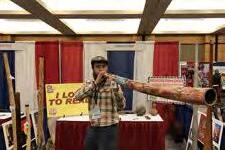




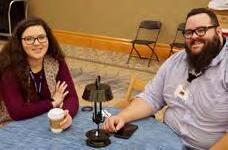





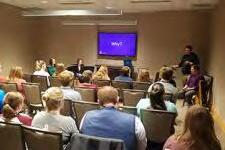

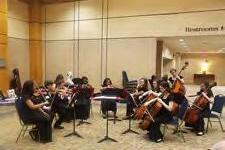













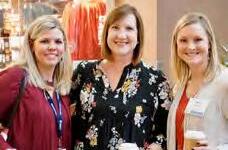



24 February/March 2019 CONFERENCE PHOTOS
AMEA AWARDS
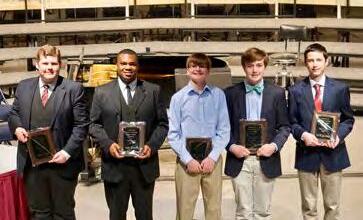








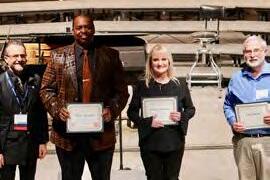
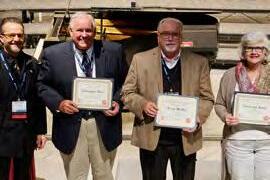


ala breve 25
AMEA Honor Roll - 25 Years Rhonda Tucker & Chris Cooper
AMEA Honor Roll - 30 Years Jeff Burnside & Larry Batchelor
AMEA Honor Roll - 35 Years Erwin Reynolds, Connie Hammond & John Clarke
AMEA Honor Roll - 40 Years Robert Sheehan, Dane Lawley, and Stephen Fowler
AMEA Honor Roll - 45 Years Christopher Rowe, Harry McAfee, and Sarah Lee Weeks
AMEA Honor Roll - 50 Years James Champion
FAME Scholarship Recipient Adriana Gramalspacher
AMEA Outstanding Administrator Dr. Deidra Robinson, Principal Albertville High School
Lacey Powell Outstanding Music Educator Dr. Robert Lyda
Barbara Odom Distinguished Service Award Dr. Carl Hancock
NBCT in Music (2018) Erin Lyon & Veronica Crawford Dr. Jed Smart (not pictured)
AMEA Hall of Fame (Class of 2019) Sharon McCann August
AMEA Young Composers Competition Finalists (L-R) Chandler Ogles, Aaron Jamal Kennedy, Parks Jenkins, David Houston, and Evan Dubose



















The Universit a.edu a B ama y of Alab bands.u ands LE 2019 CRIMSON EADERSHIP & MUSIC CAMPS bands.ua Registratio Concert B Marching Per Majoret CR CRIMSO te Camp - June 12-15, 2019 AMPS MUSIC C IMSON 1, 2019 June 10-1 LEADERSHIP INSTITUTE ON A .edu/programs/crimsoncamp n opens online: March 1, 2019 and Camp - June 12-15, 2019 cussion Camp - June 12-15, 2019 p, X 205 - 348 - 0401 BOX 870 | MUSIC BUILDING 2007 MOODY AX F | 205 - 348 - 6068 | 35487 TUSCALOOSA , AL | 0368
A True Original
compensated as the Assistant Band Director at Sidney Lanier, but otherwise, he didn’t earn that much teaching beginners and middle school bands. Each band student was charged $3.00 to participate in band, which helped some, but otherwise Mr. Black’s daily life was a labor of love for music in the Capital City.
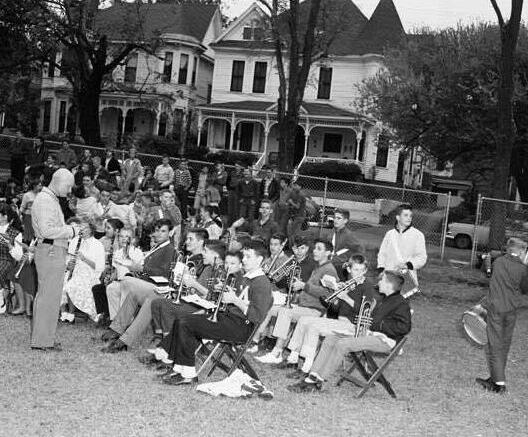 by Michael Bird
by Michael Bird
loved talking about that as much as he loved to teach people about how to properly record school music.
If you were to see the name David DeLisle Black, Jr., you might not know who it was.
Most everyone knew him as “D.D.”
D.D. Black passed away right before Christmas, at the age of 87. But he his passion for music education in the state of Alabama will be remembered always.
A native of Montgomery, Mr. Black graduated from Sidney Lanier High School in 1949. His band director was the legendary Yale Ellis. Mr. Black served in the U.S. Army Signal Corps in Korea, and throughout the 1950s attended the University of Alabama as he worked on his Bachelor of Science in Education degree. It has been said that D.D. took a little extra time at the Capstone because he enjoyed playing drums in area bands so much. All along, he was under the baton of Col. Carleton K. Butler, and served as drum captain for the “Million Dollar Band”.
After earning his Bachelor’s Degree at the University of Alabama, Mr. Black began his teaching career in 1957 at Bellingrath Jr. High School. Back in his hometown of Montgomery, he also served as assistant band director at Lanier under Mr. Tommy Binion. Mr. Black earned his Master’s Degree in Music Education in 1963.
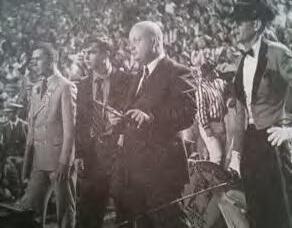

In those days, middle school band directors were not paid by the school system. D.D. was
Montgomery Public Schools had a system by which the junior high-level directors basically worked out of the trunks of their cars each day. D.D. Black traveled between Bellingrath Jr. High School and Baldwin Jr. High School every day from 1957-1966. During those years, the Bellingrath band earned Superior ratings at State Contest (today, Music Performance Assessment). The success at Bellingrath fed into the Lanier program, where Mr. Binion’s bands experienced tremendous successes at the state and regional levels.
D.D. became interested in becoming a music administrator, and completed his “AA” certificate in administration and supervision. In 1966, he was appointed to the position of Instrumental Music Consultant with the Alabama State Department of Education. Mr. Black worked for ALSDE for the next 26 years, retiring in 1992.
His focus at the State Department was to facilitate a better understanding between music teachers and principals. What many of us may recall, however, is that he wrote and edited a guidebook still used to this by band directors across the state of Alabama.
In 1980, D.D. began what I think he considered to be his life’s work. Phi Beta Mu started an All-State tape project that year, a campaign spearheaded by Mr. Black that lasted into the 21st century. He traveled around Alabama and recorded the professors from the state’s music colleges performing the Alabama All-State Band exercises and giving suggestions to students. These tapes, and later compact discs, were sold as a fundraiser for the Phi Beta Mu bandmasters fraternity but also are fondly recalled by those of us who bought them in hopes of making the All-State Band.
Mr. Black never stopped promoting rudimental drumming. He loved it, and loved talking about it about as much as he enjoyed talking about aerospace education. And he
When I organized the Robert E. Lee High School Band Reunion in 2004, I asked D.D. to speak since he was teaching across town when Lee High was founded. He’d always looked the same, this little bald man. So when he told a story of losing his hair, everyone in attendance became interested – this must have really been a long time ago!
D.D. described how he tried to fight hair loss by purchasing a hair piece. There was no air conditioning in the Bellingrath band room in
the 1950s. He said that one day the students kept laughing at him, and he exploded in anger because they wouldn’t get serious for a rehearsal. After class, he went to look in a mirror and said he knew why they were laughing – his sideburns had rolled up like window shades!
D.D. Black was a true original. Around the time of that Lee Band reunion, I asked him to take the old reel-to-reel tapes of the Lee Band and remaster them for CD. In those visits I had with Mr. Black, I’d spend hours listening to not only his stories, but learning the difference between wet and dry reverb, microphone placement, and so much more. I will always treasure the opportunities I had to sit in that man’s garage, surrounded by the aural history of band in my hometown.
Mr. Black was an avid ham radio operator, with the handle W4PRF. In amateur radio, there is a numeric code for the word ‘goodbye’. In closing, with the gratitude of those of us who knew him, here it is: 73.
Michael Bird is a choral director and general music teacher for Tallassee City Schools.
ala breve 27
WHY ARE LGBTQ+ STUDENTS DRAWN TO THE MUSIC CLASSROOM?
Oftentimes in the modern school system we see efforts to “include everyone”. Yet many state governments and school administrators simultaneously preach the suppression of certain minorities. Most often these minorities are LGBTQ+ students, and even faculty, that do not receive the proper inclusion in the general education system. While schools push for students to succeed in STEM subjects, many of these minority students instead turn to the arts to find a place of solace from the pressures of daily academic life. A place where they can be themselves. Inclusion is a large part of students’ enjoyment of arts programs, specifically in music. McBride says, “For many LGBTQ students and teachers, music classrooms are still one of the most accepting and safe spaces in… schools today.” (2016).
The Music Educator plays a crucial role in the LGBTQ+ students’ feeling of acceptance and presence in the classroom. If the Educator is unwelcoming and intolerant toward the minority students, the rest of the class will perceive this hostility and react in some way. Music Educators must understand the importance of their role and the influence they have on their students. Each of their students will form a bond with music that is their own, helping the student on their journey through life as they discover how to express themselves to others successfully. It is the task of the Music Educator to provide a haven for this discovery to take place.
Why is it that the music classroom seems to be so pertinent to the LGBTQ+
community’s sense of belonging? Associate Professor of Music and Director of Choirs at Case Western Reserve University, Dr. Garret, says that like any student, “LGBTQ students want to belong. They want positive reinforcement from teachers that they are okay. Music educators can provide this type of positive support in a number of ways, many of which focus on inclusion.” (2012).
Inclusion in the music classroom is essential in all aspects and stages of the students’ lives. “Music educators provide students with opportunities to create, perform, and reflect as individuals and as members of a group. Establishing a positive and inclusive learning environment is essential to maximizing student potential” (Garret, 2012). In elementary music children learn songs together: singing together, playing together, and learning instruments together as a group. As band and choir students age, they see the same inclusiveness arise in working together for a common goal— the next concert or competition. The students find it easy to belong to a group of people who all share a deep passion for similar things. At the same time, these students also desire a place where they can be an individual.
In the modern age, LGBTQ+ students find it hard to cope with the day to day struggles they face. Roughly 90% of LGBTQ+ high school students report being verbally harassed due to their sexual orientation, 60% feel unsafe on a regular basis, nearly half experience physical harassment or assault, and almost 2/3

hear homophobic remarks from school personnel. (Bergonzi, 2009). The very people charged with protecting students are helping to put LGBTQ+ students in dangerous emotional and physical states. The music classroom has the potential to protect its students from these dangers, and it all begins with the efforts of the Music Educator.

The first step to making a classroom safe for any minority is to be aware of your own personal bias(es) and be willing to accept any student that comes your way. The educator must be open and provide a welcoming classroom environment, so no student feels rejected or unwanted. Bergonzi describes this fine line: “Rather than well-intended sympathy, empathy from and supportive alliances with straight teachers, staff, and students are needed.” This means instead of simply feeling bad for the LGBTQ+ community, you are trying to truly understand their predicament and what you can do to help. It is not the students’ fault they may feel unsafe, but perhaps the fact that they truly are not safe in their day to day environment. Once the educator understands this, they can create a safer space for their students and provide an example to the future educators in the room and to other classrooms in the county and even the state. Garret mentions that the societal norm that prohibits many teachers from realizing their classroom is not as inclusive as it could be is easily overcome through communication: “Personal bias is frequently identified as an obstacle to inclusion of LGBTQ students, whether based on religious beliefs or on other

28 February/March 2019
DeLee
Benton - President, AMEA Collegiate Division
value systems…society views heterosexuality as the standard and all others as deviations.” (Garret, 2012). Conversations with local LGBTQ+ organizations, support groups, and even just local families is one of the first steps an educator can take to bring awareness to the classroom. LGBTQ+ students want to learn and be involved in music just as desperately as heterosexual students. Therefore, it is important to “advertise” your program correctly to the entire community of students. For example, using sports and other “manly” things to bring people through your choir’s doors is a strategy that leaves out a good percentage of young men who do not resonate with sports or “manly” things. McBride mentions an advertisement he saw that read, “REAL MEN SING”. A seemingly attractive idea, but not one that will appeal to all young men. If a student desires to sing and truly has a hunger for music, that pupil should be your target— and they may not follow the conventional “masculinity” stereotype. Instead of a stereotype, advertise your group to the young musicians out there who simply want to make music.
It is amazing that music can provide a safe place for LGBTQ+ students when schools have not yet stepped up to the plate. The culture of the music classroom determines the future of the program, so it is important to keep it inclusive and open but to not change oneself in the process of creating the classroom culture. For example, an LGBTQ+ teacher would not benefit from imitating a gender stereotype (heterosexual Male/Female) in the classroom. In contrast, a person of religion does not need to “convert” to anything new to create a safe classroom, nor does a straight person need to strive to hide their sexuality. These are simply examples of personal bias that the educator should be aware of. Curriculum across schools is improving with inclusivity of LGBTQ+ influencers being mentioned throughout history. In music, Bergonzi suggests we improve how we represent music history by speaking more broadly of music. This can be done by
Deshawn Sewer, Treasurer (Alabama A&M University)
DeLee Benton, President (University of Montevallo)
Jackson Vaughan, VP/President-Elect (Samford University) Isabelle Paige, Secretary (University of Alabama)

mentioning other cultures, women in music, and the immense influence LGBTQ+ composers and performers have had on western music for decades. (2009).
Students should not feel as though they are a thing that does not belong in society and has not existed until now. As Bergonzi (2009) says, “Sexual orientation in music education is not a new phenomenon.” LGBTQ+ students have the opportunity to discover music and what it means to them in their own lives through the music classroom. Music educators are the crucial piece of the safe space puzzle, providing the tools, support, and acknowledgment students need to succeed. The role and influence of music educators in the lives of LGBTQ+ students is an essential first step to those same students going out into the world and discovering what being LGBTQ+ means to them and how they can share their story with the world, creating an endless cycle of love and support for future students.
Works Cited
Bergonzi, Louis. “Sexual Orientation and Music Education: Continuing a Tradition.” Music Educators Journal, December 2009, pp. 21-25.
Garrett, Mathew L. “The LGBTQ Component of 21st-Century Music Teacher Training: Strategies for Inclusion From the Research Literature.” Applications of Research in Music Education, November 2012, pp. 55-62.
Lehmann, Andreas, Woody, Robert, and Sloboda, John A. (2007).
Psychology for Musicians: Understanding and Acquiring the Skills. New York: Oxford University Press.
McBride, Nicholas R. “Singing, Sissies, and Sexual Identity.” Music Educators Journal, June 2016, pp. 36-40.
ala breve 29
2019-2020 AMEA Collegiate Officers
100 % Retention R “Go Team!”
by Marcia Neel
Marcia Neel serves as president of Music Education Consultants, Inc., a consortium of music education professionals who work with a variety of educational organizations, arts associations, and school districts to foster the growth and breadth of standards-based, articulated music education programs. She also serves as Education Advisor to the Music Achievement Council, a 501(c)(6) organization whose sole purpose is to assist directors in recruiting and retaining students in instrumental music programs through effective professional development programs. In 2016, Marcia was named Senior Director of Education for the Band and Orchestral Division of Yamaha Corporation of America and subsequently, a Yamaha Master Educator. Neel also serves as a member of the Board of Directors of the Percussive Arts Society.

Edited with permission from original article published in SBO Magazine
Students continue to participate in our music programs because they cannot imagine school without the meaningful engagement that our courses provide. For one reason or another however, we continue to lose some students along the way.
One South Carolina school district came to the realization that they could do something about it. Below is their story and some initial steps they are taking to work toward the vision of leading 100% of their students to a life-long relationship with musicmaking.
“Go Team!” We’ve all heard it a MILLION times – this familiar cheer for an intensive sporting event where the outcome has a significant impact one way or the other. Using this same approach – i.e. the concept of an intensive goal creating a significant impact as
a result – innovative school district music departments across the country, like the School District of Pickens County (SDPC), SC, are taking the “Go Team!” approach to a whole new level!
During the district-wide E3—Engage, Excite and Enrich—Professional Development Day in early August, the SDPC Music Educators were challenged to explore how they might better to not only Engage, Excite and Enrich the lives of their students, but also to communicate the great work of their program and the high achievements of their students to their various constituencies—e.g. students not yet participating in the music program, school faculty and staff, district leadership, parents, and the greater community. Even though these educators were doing a tremendous job with their own programs, there was a sense of being untethered—as if there were no specific district-wide direction and as if they were on their own to “do it all.” Their perception was that even though they were each working diligently, they were not getting the traction they had hoped for and, in fact, deserved—to capture the attention of these various constituencies and to ensure that a common message was being delivered to all.
It was my privilege to have been asked to facilitate the PD activities which involved facilitating the entire “unification” process with the K-12 music education faculty for the day. It didn’t take too long to discover the first item that needed immediate attention—that being that although these teachers all worked in the same department within the same district, they didn’t all know each other! Surprised? Probably not. Is this a problem? Probably yes!
So we thus kicked off the day with introductions and everyone was courteous, yet
skeptical. We all know how these PD sessions can be so it was my initial charge to get this group of approximately thirty (30) music educators—many who had just met one another for the very first time—to jump on the band wagon and move forward with a unified purpose.
Our initial discussions centered around the conception of what others in our circle of influence—e.g. parents, administrators, community—think that we do. To encourage participation, we tossed around a cute little teddy bear bean bag that I had brought along from Las Vegas from one person to the next asking them to respond to the questions that were posed and little by little, I could see a few smiles here and there and soon, it became my job to bring the cadre of music educators back to order. It was EXACTLY what I had hoped for. We discovered that of all of the above groups, it was the music educators themselves who were the only ones who had an accurate comprehension of what they do and how it matters. The aha moment! This led us to understand that it was imperative that we generate a group identity.
We then spent a great deal of time looking at statistics that show how music-making really does effect students and we subsequently encouraged each other to share personal stories of students whose lives had been changed by it. Along the way, we kept bumping into that ever-present question, “Why music?” Another aha moment! We were going to have to come up with an answer to this question that would satisfy each and every one of the teachers. Little did they know how the answer to this question would come to have such a significant consequence for all of them.
Breaking up into groups was the best way to
30 February/March 2019
Rate?
give everyone the opportunity to be heard so with some guidance through the providing of a set of specific questions, we broke into groups according to feeder alignment which led to four (4) separate sets of teachers working together to come up with a “unified” answers to
1. Who are we?
2. What do we envision for our community? and thus,
3. What is our purpose and why music?
go out into the world equipped with the means to enjoy a significant and meaningful life.
Below are the impressive answers to these two questions that “team” came up with and refined after coming out of the initial breakout sessions.
Who are we?
The district-wide, K-12 Music Department is the inclusive team of Music Educators which supports and promotes Music Education within the School District of Pickens County by providing quality, sequential instruction through fulfilling, life-changing opportunities for all of its children.
What do we envision for our community?
The School District of Pickens County K-12 Music Department envisions a community where all are actively engaged in life-long, music-making activities.

What is our purpose and why music?
The Mission of the School District of Pickens County K-12 Music Department is to enhance the overall quality of life for all children by inspiring in them the desire to experience the joy of musicmaking throughout life.
It was time to break for lunch and someone shouted, “Let’s all go to lunch together!” Once it was determined which restaurant could actually seat thirty (30) people all at once in one area, we were on our way to the very first “SDPC Annual Music Educator’s Luncheon.” The group continued to buzz all through lunch and truly enjoyed “breaking bread” together.
parents of these students to envision their children as high school music students right from the very beginning.
This break-out session resulted in a comprehensive, inspiring and invigorating process that elicited inclusive conversations that yielded a surprising discovery—the realization that as varied as each teacher’s concerns were with regard to issues they were having to deal with in their particular “world” at their particular school, when it came right down to it, each teacher really wanted the same thing—for ALL STUDENTS to have a life-long relationship with active music-making. WOW! This philosophy is not about trying to create more symphony musicians. Rather, it’s that if students continue participating into adulthood as active music-makers—whether at church or in any variety of community groups—their lives would be substantially fullfilled and thus considerably more productive, uplifting, and joyful. Thus, what they are really doing is preparing students to
So what would happen next? We returned from lunch to begin working on how they, as music educators, could really drive their newly-established Vision and Mission. With just a few ideas to prime the pump, the new “team” went into action scoring goal after goal! Their ideas for “actionable items” just kept coming and coming but most importantly, they agreed to begin working TOGETHER consistently so that they could continue to move this undertaking forward. The first order of business was to find a way to articulate their game plan.
Thankfully, we had sufficient time to strategize a number of specific actions. These action items will not only serve to Engage, Excite and Enrich (the original goal of the PD) but also to promote the vision for elementary students to picture themselves as high school music students and for the
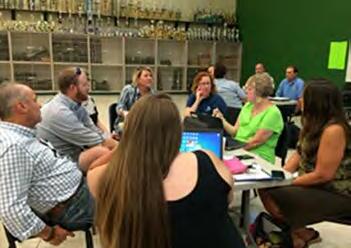
1. A district-wide music department mission statement will be formalized and promoted to create increased district/community awareness.
2. Small ensemble performances will be scheduled at the beginning of every school board meeting with time provided afterward for the representative school board member to speak to the students about their accomplishments in music.
3. Each music teacher will include a recruiting section on their school website.
4. An educational plan/flow chart will be developed that will prescribe how students can continue taking music classes through all four (4) high school years. This will be provided appropriately to the parents of music students.
5. The elementary band students will be featured with the high school band as VIP guests at one of the halftime shows annually. The announcer will quickly call out each elementary student by name and each will the run onto the field into position in front of a high school student who plays a like instrument. The groups will be conducted by the elementary school teacher/director who will also choose the material to be performed. This could be as simple as a phrase made up of two or three different notes played over a series of chord changes performed by the high school band. Dance moves will be included! The purpose is to bring the elementary school students into the high school “arena” and for their parents to begin envisioning their elementary school students as a high school band student. The high school booster parents will provide complimentary refreshments and VIP seating for the parents of the elementary
ala breve 31
students.
6. The high school instrumental directors will choose an appropriate selection and score a recorder part to feature the elementary school students on that selection in the Spring Concert. This event is also geared toward having the students view themselves as high school instrumental students and for the parents to see their children as high school instrumental students performing right on the high school stage.
7. The elementary and middle schools teachers will invite the high school teachers to conduct a piece on one of their school concerts.
8. The high school principals will work with the middle school principals to facilitate scheduling so that recurring visits become part of the regular teaching assignment.
9. The high school parent booster organization will host the middle school parent organization for a chili/spaghetti supper to visit with them about the many benefits of participating in the high school program. Brief entertainment will be provided by the high school students at every meeting. Several high school students will also be invited to speak to the middle school parents about the impact the high school program has had on them personally.
10. The high school students will write congratulatory notes to the middle school and elementary students as appropriate to commend them on an extraordinary performance, being chosen for something special, etc. This activity is to develop a “Big Brother/Big Sister” relationship with the younger students.
11. The high school students will attend the concerts given by the programs that they participated in before coming to the high school. After the concert, they will provide positive feedback to the students of that program via written notes (see #10) or emails to the director to be read aloud to the students during class.
12. The principal of one of the middle/elementary schools will be invited to provide remarks at one of the concerts being held at the high school and vice versa. Elementary/middle school parents will gain a sense of confidence in the high school program when they see the high school principal speaking so favorably about it at this
event. Conversely, the high school parents will be so impressed that the elementary/middle school principal still cares enough about their children to the degree that he would make the time to speak at the high school concert. In the big picture, these types of “principal exchange” activities reinforce the idea that the accepted, standard procedure is for students to continue in music throughout their school years.
Additional ideas that could be implemented might also include the following.
13. The high school students will come up with an idea for a comprehensive video about their program to be posted on the department’s website. The goal is to “tell the story” about their program in a way that is appealing to fellow students.
14. The beginning band teachers will begin using First Performance for Band/Orchestra Demonstration Concert in the first six or seven weeks of the first year of study for the beginning instrumental students. This mini-concert will close with a high-spirited performance from the high school ensemble. The school principal will be invited to read the provided narrations. More information on how to order a copy is available at www.musicachievementcouncil.org or through your local music dealer.
15. Appropriately selected high school students will provide lessons to beginner/intermediate, elementary/middle school students at a Summer Music Camp to be held at the high school during the first week (or two) after the close of school. This will pair younger students with older students in a supervised setting which could motivate the younger musicians to practice over the summer. It also provides another opportunity for the high school students to serve as role models. In addition, this experience could enlighten the high school students to the possibility of becoming a music educator.
So much was accomplished in that one day! The team capitalized on the model from the business world of identifying what it was that they, as one, unified organization, agreed was their true Mission. We even spoke about adding a “tag line” or creating a slogan to take their essence a step further. Based upon their self-identified goal, some possible tag lines could include, “Creating a more fulfilling future for our students” or “Creating harmony in our community.”
When the Las Vegas Convention and Visitor’s Authority created the slogan, “What happens in Vegas stays in Vegas,” they created a masterpiece! Everyone knows it and in fact, all one has to say is, “What happens in Vegas. . .” and the answer pops right into your head. So, how can an example like this be used as a slogan for our music departments? One might consider, “What happens in music. . . lasts for a lifetime.”

There is still a long way to go, but this exceptional music education team in the School District of Pickens County is showing incredible dedication and fortitude in moving forward with their message—to improve the quality of the lives of the students and the community. They have already had a second professional development day to continue working on their plan. It will take a great deal of endurance, determination, and even courage over the long term, but the outcome of this game plan are already starting to have a considerable impact. The team photo shown below speaks volumes!!! GO TEAM!

32 February/March 2019
Sharon McCann August - Class of 2019
Theresa McKibben - Class of 2016
Vicki Portis - Class of 2016
John Bradley - Class of 2015
Bill Brunner - Class of 2015
Jim Duren - Class of 2015
Curtis Hollinger - Class of 2013
Billy R. (Rip) Reagan - Class of 2012
Joseph C. Riemer, Jr. - Class of 2010
Roland Lister - Class of 2009
Pat Morrow - Class of 2009
David Walters - Class of 2009
Gerald Welker - Class of 2009
Gene Black - Inaugural Class of 2008
Carleton Butler - Inaugural Class of 2008
Ed Cleino - Inaugural Class of 2008
William Dawson - Inaugural Class of 2008
William Denison - Inaugural Class of 2008
Gene Gooch - Inaugural Class of 2008
Wilbur Hinton - Inaugural Class of 2008
Johnny Jacobs - Inaugural Class of 2008
Dianne Johnson - Inaugural Class of 2008
John M. Long - Inaugural Class of 2008
Floyd McClure - Inaugural Class of 2008
Frances Moss - Inaugural Class of 2008
Eleanor Nation - Inaugural Class of 2008
Lacey Powell - Inaugural Class of 2008
James Simpson - Inaugural Class of 2008
Thomas Smith - Inaugural Class of 2008
Hugh Thomas - Inaugural Class of 2008
Orland Thomas - Inaugural Class of 2008
Johnnie Vinson - Inaugural Class of 2008
Truman Welch - Inaugural Class of 2008
AMEA Membership Honor Roll
The Alabama Music Educators Association is proud to recognize those AMEA members having 25 or more years of continuous membership in NAfME. This year, each person attaining 25 years and those reaching increments of five years beyond that will be honored. The following music educators were honored during the 2019 Conference.
James Champion - 50 years
Ted Mann - 45 years
Christopher Rowe - 45 years
Sarah Lee Weeks - 45 years
Harry McAfee - 45 years
Rebecca Walker - 40 years
Roger Lawley - 40 years
Bonnie Lipscomb - 40 years
Frederick Stroup - 40 years
Stephen Fowler - 40 years
Robert Sheehan - 40 years
John Clarke - 35 years
Connie Hammond - 35 years
Erwin Reynolds - 35 years
Debora Mayes - 35 years
John Lambert - 30 years
Larry Batchelor - 30 years
James Simpson - 30 years
Jeff Burnside - 30 years
Mary Hughes - 30 years
Steve Price - 30 years
Richard White - 30 kyears
Rhonda Tucker - 25 years
Chris Cooper - 25 years
ala breve 33
AMEA Hall of Fame
Changing Culture In The Classroom Through Jazz

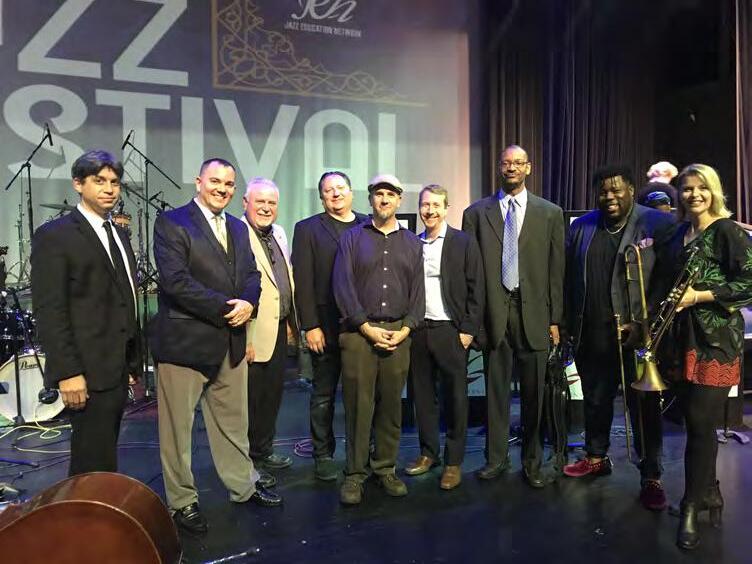
The former curator of American Music, John Edward Hasse (the same man who turned April until Jazz Appreciation Month), argues that jazz ranks among this country’s greatest contributions to world culture: “In my judgement, it’s a fundamental part of who we are as Americans. Young people in Germany are surely educated about Bach and Beethoven, and young people in the United States should surely know about Louis Armstrong and Duke Ellington”. However, are young people in the United States learning about Louis Armstrong and Duke Ellington?
Secondary music teachers are often expected to focus on Marching Band, concert band, MPA’s, and All State. When is
by Dr. Matt Leder
there time to teach anything else? Some would argue that improvisation should be studied only after a student has a high proficiency on the instrument. Yet, children in New Orleans are improvising well at a very young age. With the limited amount of time in the day, why should educators devote any time or effort to expose youth to this genre of music? What is jazz really saying and is it still of value?
Jazz reminds us that we can work things out together. When you get a group of people together and try to invent something, there is bound to be conflict. There are times where you follow and there are times that you lead. One must never give up and we should remember there is an art to
negotiating change with style. One of the most prized possessions of this music is your own unique sound. Through sound, jazz brings you to the core of yourself. This music celebrates creativity, imagination, individuality, and comradery.
Wynton Marsalis once stated, “Jazz is America’s past and its potential, summed up and sanctified and accessible to anybody who learns to listen to, feel, and understand it. The music can connect us to our earlier selves and our better selves-to-come. It can remind us where we fit on the time line of human achievement, an ultimate value of art”. In studying this music, we gain a better understanding of our history. There are also lots of musical benefits for the aspiring musician or listener.
Improvisation is one of the National Standards for Music Education and an important component in jazz, but teachers often balk at the prospect of teaching it. The significance of jazz may or may not sound important at this point, but let’s us look at the advantages of exposing youth to this music in our classroom.
Active Listening - Aside from the historical significance, recordings can inspire and motivate students to practice and listen. Looking back in our own musical development, did anyone sit down and
34 February/March 2019
Alabama JEN Unit Faculty Combo with Guest Artists
(from left to right: Abe Becker, Dr. Matt Leder, Dr. Tony McCutchen, Dr. Andy Nevala, Dr. David Phy, Dr. Steve Roberts, Jason Marsalis, Jeffery Miller, and Bria Skonberg)
Jason Marsalis with the
teach you how to truly listen? Generally speaking, most people listen to music from a whole perspective vantage point. By taking more of a participatory approach, a concept called “active listening”, you can listen to music in layers. This concept can be applied to any style of music and is extremely important in the development of any musician. Have you ever listened to a recording specifically for rhythm? How about focusing on nothing but the bass? Listen to a recording and try bringing an instrument to the “front” of the conversation. Everyone has this skill! Think about eavesdropping…have you ever been in a conversation with friends and then heard someone across the room talking about you? You can eavesdrop and still be courteous to the conversation before you. You can do the same thing with music. Tune out the melody and listen to the accompaniment. Switch the focus the next time you listen. This skill can used in ANY genre of music!
Role Models – If we were going to take a trip somewhere, we would probably plug our destination into our GPS or ask our phone for directions. I give workshops all over the country and constantly ask students, “Who is your hero on your instrument”? There are exceptions, but several don’t have a name to suggest and if they do, they can’t name a specific song or
recording of the artist. This is like getting in your car and just driving with no destination in mind! Sometimes it’s cool to just go for a drive, but with the rising price in gas you might want to eventually have a destination in mind! The same holds true for ourselves and our students. How can we expect our students or ensembles to perform at a high level without having a role model in mind? Have you ever heard, “You are what you eat”? Well, “You are what you listen to”! Teachers and students should constantly saturate the ear with professional examples. If you don’t sight read on a regular basis, the skill can be hindered. If we don’t listen to high quality music often, our levels of expectation decrease. If our students have role models on their instruments, they have a destination in mind. If anyone wants to dig deeper, start transcribing! This is one of the fastest ways to improve as a musician. Why don’t we do it? Because it is hard! Stay engaged, encourage your students to listen, and force yourself to listen to high quality music while in your office or driving home. Carve out the time for success!
Inspire - You can put a New Orleans brass band anywhere in the world and people will dance. You can play a recording of Louis Armstrong and almost anyone in the world will recognize his sound. That’s profound and stands the test of time. This music has evolved and continues to move forward. I’ve played recordings of the late Roy Hargrove performing “Strasbourg St. Denis” and I’d be so bold to say almost 100% of listeners love the tune. Jazz has something for everyone. A good majority
of Americans don’t even know what jazz is. I have been playing a jam session in Downtown Gadsden the third Tuesday of every month for over 4 years and it has become a popular event for the community. I started the November GSCC Jazz Festival two years ago and have brought in several internationally renowned artists including Delfeayo Marsalis, Jason Marsalis, Jeffery Miller, Bria Skonberg, Adam Rapa, and several others. This year, we will celebrate “Women in Jazz”. It is inspiring to see culture changing! Pick up your own instrument and shed! If we can “walk the walk, we can talk the talk”! Modeling and inspiring students through our own performance holds a lot of weight. As we inspire our students to become better musicians, the quality of our ensemble performance improves. This can cross over into any style we aspire to perform!
Yes, jazz is alive and well! I just returned from the 2019 JEN Conference in Reno and it was inspiring to see so many performances, jam sessions, lectures, and hangs. There were people from all backgrounds and ages. If you haven’t attended a Jazz Education Network Conference, make plans to attend the 2020 JEN Conference in New Orleans, January 8-11th! I am currently the Alabama JEN Unit President and I will be announcing some exciting new initiatives for our local area. Thanks to everyone for supporting jazz education and performance.In the spirit of swing,

 Dr. Matt Leder
Dr. Matt Leder
ala breve 35
the GSCC Show Band
GSCC Showband Trombone Section
My Journey with the 2019 Grammy Awards
by Deanna Bell
When I think of the Grammy Awards, I think of Adele, Alison Krauss, Stevie Wonder, and John Williams. I think about the glitz and glamour of the evening, and wonder… “Who will win ‘Record of the Year?” I get excited when I see my favorite musicians perform and I love seeing everyone in their designer clothes.
How did I become a part of this? How did I become a part of the Hollywood glitzy Grammy awards?
In May, I received an email from the Grammy Museum that I had been nominated by my friend Joy Smith for the Grammy Music Educator Award. Joy had filled out an application and sent it in without me knowing about it. I was so honored and excited. I thanked her for thinking of me. I thought that was it. I had been nominated by my friend and colleague and it was the best feeling in the world.
A few weeks later, I received another email saying that I had been selected as a Grammy Music Educator Award Quarterfinalist. I was on a list of 188 music educators in the country that was being considered for the 2019 Music Educator Award. They wanted me to create a portfolio and submit a biography. Gulp! This is when I became nervous! What should I say to the Grammys about my music program in Vestavia Hills, Alabama? So, I let the kids do the talking for me. The kids shared their favorite lessons about MIDI, guitars, song writing, and singing. We sent them recordings of our concerts and of our classes. We sent them a recording of a traditional Kodály lesson where we played a southern game, called “Black Snake.”
In September, I received another email that said: “Congratulations! It is my pleasure to inform you that you have been selected as a Semifinalist for the 2019 Music Educator Award. You have been selected as a semifinalist because the Grammy’s consider you to be an outstanding example of a music educator. As a Semifinalist, you will receive a $500 personal honorarium and a $500 matching grant for your school’s music program.” I screamed, jumped, danced, hugged everyone in sight, and I felt like I had just won the lottery! I was now on a list with 24 of the best music educators in the country.

In 2014 the Recording Academy and Grammy Museum created the Music Educator Award. It was established to recognize current music educators who have made a significant and lasting contribution to the field of music education and who demonstrate a
commitment to the broader cause of maintaining music education in the schools.

The Grammy Museum along with the Grammy Music Education Coalition support music teachers and music programs all across the country. They support music programs by giving donations, arranging partnerships with the music industry, and by bringing communities together to share the importance of Music Education.
The Grammys are no longer just about the glitz and glamour of Hollywood. They now support music teachers and what we do in our classroom. They donate money and bring in huge sponsors, such as Ford Motor Company and Best Buy, to support to music programs all around the country. They have Grammy camps for kids and award grants to music teachers.
I have had an amazing journey with the Grammys this year. You can have this journey too. Nominate your friend for this award. Learn more about the Grammy Museum and the Grammy Music Education Coalition. They are here to support us and what we do.
Even though I did not make the finals, I feel like I am a winner. I am just as excited now as I was when I was first nominated. And, I am most proud that the Grammys and Grammy Museum are recognizing music educators across the country.
36 February/March 2019


Band Music Reviews

We are in the throes of organizing our annual Honor Band Festival here at UA this week. One of the most exciting things that happens during this time is that we order all of our clinicians’ music for the festival and get the folders prepared for the big weekend. I have always enjoyed looking at what our guest clinicians have selected for the bands to perform. I learn so much from listening to these great new (and some golden oldies) pieces. I have selected a couple of these pieces for this review. Observing honor band rehearsals is a fantastic way to become aware of new literature that is available, and to learn some fantastic “tips of the trade” that you can take home to your ensemble! Hopefully you may be able to find a new piece for your spring concert.
Only Light, Only Love by Leslie Gilreath is a beautiful new lyrical piece that features several solos and your percussion section. Based on a quote from Dr. Martin Luther King, Jr., the piece is an affirmation of an undying belief in light and love and the overwhelming need for both in our world today. Published by C. Alan Publications at the Grade 4 level and with a performance time of approximately 5:30, Only Light, Only Love is an excellent addition to this genre of music for our ensembles. The piece opens with manageable solos for flute, bassoon, clarinet, horn and oboe, along with keyboard percussion and piano. In addition to teaching opportunities for working on lyrical ensemble playing, the piece also provides numerous teaching moments for moving between quarter note and half note pulse. The students are also asked to move between duple and triple subdivision at a slower tempo. Only Light, Only Love provides a relevant message and technical challenges for our students. It would be a fantastic addition for your next concert.
Michael Markowski’s music is always fun for the audience members and it provides a challenge for the performers. His new work, Sunny-side Up, definitely lives up to these characteristics. It is a piece full of energy and anticipation. With an infectious groove and melodies that will entertain and educate, this piece will no doubt be a hit with your students and your audience members. Sunny-side Up is filled with rhythmic ostinato in wind and percussion sections and dotted-eighth sixteenth melodic lines accompanied by syncopated lines in upper voices. The piece also allows for those teaching moments that involve counts of silence and entering accurately after those moments of silence. It is written at the Grade 3 level, but it is one of those compositions that sounds more difficult than it actually is. Sunny-side Up is a fun and educational piece to add to your
spring concert program that I’m sure your students and audience members alike will enjoy.
One of the most performed composers today, Julie Giroux, has given us some amazing music over the past few years. Each new piece that Julie writes is some of the most significant music that we can offer our students. Her ability to challenge and touch the listener is unmatched. One of her newest pieces is a beautiful lyrical grade 3 work entitled Our Castaways Our Castaways is a tribute to rescue animals, with her tribute in the score reading “For those who rescue, those who get rescued and especially those whose rescue never comes”. With its smooth and connected melodic and harmonic lines, Our Castaways is a work that should have a feeling of continuous, seamless voices, challenging the performers to pay attention to all dynamic and phrase markings. Written in Julie’s lush and warm style, Our Castaways will allow your students the opportunity to perform with attention to breathing, supported air and pitch control. The message of Our Castaways will engage your students and audience members. A moving tribute for your next performance, Julie Giroux’s Our Castaways is a welcome addition to the wind band repertoire.
I hope you have a wonderful spring semester, and as always, do not hesitate to contact me if I can be of assistance to you or your students.
Randall Coleman Wind Band Music Reviewer Associate Director of Bands The University of Alabama Music Director and Conductor The Alabama Winds
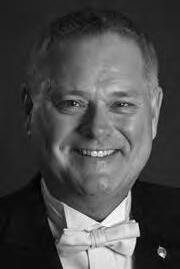
ala breve 39
Randall Coleman
AMEA Division Events 2018 - 2019
Alabama Bandmasters Association
40 February/March 2019
Event Location Date Deadline Statewide All State Solo Festival Univeristy of Alabama Huntsville 24-Apr-19 3/1/2019 All State Festival Von Braun Civic Center April 25-27, 2019 3/1/2019 Summer Convention Hampton Inn June 19-20, 2019 District 1 District Fall Meeting Huntsville First Baptist Church 20-Aug-18 8/15/2018 All State/ District HB Auditions Sparkman HS January 25 & 26, 2019 12/10/2018 Unassigned All-State Auditions Sparkman HS 26-Jan-19 12/10/2018 District Honor Band Grissom HS February15 &16, 2019 MPA #1 Huntsville HS February 27 & 28,2019 1/27/2019 MPA #2 James Clemens HS March 12-14, 2019 1/27/2019 Solo and Ensemble #1 Meridianville MS 30-Mar-18 3/7/2019 Solo and Ensemble #2 Hartselle HS 13-Apr-19 3/21/2019 District Spring Meeting TBA 13-May-19 5/8/2019 District 2 District Fall Meeting Gadsden City HS Band room 28-Aug-18 All State Auditions Albertville HS 12-Jan-19 12/3/2018 Unassigned All-State Auditions Sparkman HS 26-Jan-19 12/3/2018 District Honor Band Albertville HS February 8-9 2019 1/28/2019 MPA Gadsden City HS Audiorium February 26-March 1, 2019 1/28/2019 Solo and Ensemble #1 Southside HS 15-Apr-19 4/1/2019 Solo and ensemble #2 Oxford HS 29-Apr-19 4/1/2019 District 3 District Fall Meeting TBA 8-Sep-18 All State Auditions Muscle Shoals HS 26-Jan-19 1/7/2019 District Honor Band Russellville HS February 15-16, 2019 2/1/2019 MPA UNA March 5-7, 2019 2/8/2019 Solo and Ensemble Muscle Shoals HS 4-May-19 4/15/2019 District 4 District Fall Meeting Pelham HS 10-Sep-19 All State Auditions Hoover HS 26-Jan-19 1/15/2019 MPA Middle School Hewitt Trussville HS March 4-7, 2019 12/21/2018 MPA High School Vestavia HS MArch 11-14, 2019 12/21/2018 District Honor Band Thompson HS April 5-6, 2019 2/1/2019 Solo and Ensemble #1 Mountain Brook JH 30-Apr-19 3/22/2019 Solo and Ensemble #2 Bumpus MS 4-May-19 3/22/2019 District Spring Meeting Bumpus MS 16-May-19 District 5 District Fall Meeting Heather Henson's House 23-Aug-19 All State/ District HB Auditions Prattville HS 26-Jan-19 1/14/2019 Unassigned All-State Auditions Prattville HS 26-Jan-19 1/14/2019 District Honor Band University of Alabama February 15-16, 2019 2/6/2019 District Meeting University of Alabama 16-Feb-19 MPA University of Alabama March 1-2, 2019 2/8/2019 Solo and Ensemble Prattville JHS 21-Mar-19 3/7/2019 Solo and Ensemble Tuscaloosa Co. HS 15-Apr-19 4/5/2019 District 6 District Fall Meeting Lake Martin 18-Aug-18 All State Auditions Opelika HS 26-Jan-19 1/10/2019 Unassigned All-State Auditions Prattville HS 26-Jan-19 1/10/2019 District Honor Band Auburn HS February 15-16, 2019 2/4/2019 MPA Opelika HS March 5-7, 2019 2/11/2019 Solo and Ensemble Trinity Presbyterian 4-May-19 4/15/2019 District Spring Meeting TBA 13-May-19 District 7 District Fall Meeting St. Michael Catholic HS 27-Aug-18 All State Auditions Saraland HS 26-Jan-19 MPA Baker HS March 19-22, 2019 District Honor Band TBA March 28-30, 2019 Solo and Ensemble Spanish Fort MS 4-May-19 District Spring Meeting St. Michael Catholic HS 6-May-19 District 8 District Fall Meeting Enterpriise HS 20-Aug-18 All State Auditions Troy Elementary 26-Jan-19 1/15/2019 MPA Enterprise Performing Arts Center March 12-14,2019 2/15/2019 District Honor Band Enterprise HS March 15-16, 2019 2/22/2019 District Spring Meeting Enterprise HS 15-Mar-19 Solo and Ensemble #1 Carver Magnet School 4-May-19 4/10/2019 Solo and Ensemble #2 Greenville HS 11-May-19 4/10/2019
Alabama Vocal Association
Elementary/General Division
Alabama Orchestra Association
AMEA Collegiate Division
ala breve 41
August 25, 2018 East Alabama Music Workshop Grace United Methodist Church, Auburn, AL October 12, 2018 13th Annual Elementary Music Festival Samford University’s Wright Center October 13, 2018 Fall Workshop Location TBA January 17-19, 2019 AMEA Professional Development Conference Birmingham-Jefferson Convention Complex August 1, 2018 Composition Contest Deadline December 1, 2018 Scholarship Application Deadline August 6, 2018 Audition Excerpts Posted January 17-19, 2019AMEA Conference September 28, 2018 Audition Registration Deadline February 7-10, 2019All-State Orchestra Festival October 14, 2018 Auditions Must be Completed April 5, 2019 Orchestra MPA
TBA Collegiate Summit Samford University January 17-19, 2019 AMEA Professional Development Conference Birmingham-Jefferson Convention Complex Event Date Location Fall Workshop September 7 Huntingdon College ASSC Audition Submission Deadline October 20 ASSC Festival March 5-7 Birmingham All-State Auditions November 1 Mobile November 2-3 Montgomery November 3 Florence November 5-6 Huntsville November 7 Gadsden November 8-9 Tuscaloosa All-State Festival March 7-9 Samford University AMEA Board Meeting January 16 BJCC AMEA Conference January 17-19 BJCC Solo and Ensemble Date Location District I April 4 Highlands Baptist Church District II April 2-4 University of Alabama District III February 23 District IV February 7 Jacksonville State University District V February 19-20 First Baptist Church District VI April 4 TBD District VII (Fall) November 15 District VII (Spring) February 7 Spring Hill Baptist Church SCPA Date Location District I February 28 First Baptist Church, Decatur District I March 1 Highland Baptist Church, Florence District II April 2-4 University of Alabama District III March 18-20 TBD District IV April 11 Gadsden City High School District V April 8-9 TBD District VI April 4 TBD District VII March 26 Spring Hill Baptist Church OCS/OA/ME Date Location District I TBD Decatur Middle School District II November 27 Paul W. Bryant High School District III November 26 Cahaba Heights United Methodist Church District IV November 28 Oxford High School District V November 13 Madison Academy District VI November 15 Alabama Christian Academy District VII November 30 St. Michael Catholic High School
Certified In 2018:
Veronica Crawford, Tuscaloosa City Schools
Erin Lyon, Leeds City Schools
Jed Smart, Tuscaloosa County Schools
Complete List: Music/Early Adolescence Through Young Adulthood
David Allinder, Jefferson Co School District
Darwin Anderson, Madison City Schools
Kimberly Bain, Vestavia Hills City Sch Dist
Kristi Bowers, Huntsville City School Dist
Jonathan Cagle, Jefferson Co School District
Jeff Calvert, Jefferson Co School District
John Cooper, Decatur City School District
Laura Doss, Birmingham, Alabama
Donald Dowdy, Madison Co School District
Gary Foster, Mountain Brook City Sch Dist
Traci Fuller, Montgomery Co School District
Gregory Gumina, Jefferson Co School District
Joel Henson, Jefferson Co School District
Margaret Heron, Jefferson Co School District
Sandra Hill, Jefferson Co School District
Daniel Hornstein, Huntsville City School Dist
Edward Horton, Vestavia Hills City Sch Dist
John Kincaid, Hoover City School District
Lee Mason, Birmingham City School Dist
Brian Neugent, Hoover City School District
Regina Raney, Decatur City School District
James Schaeffer, Hoover City School District
Jed Smart, Tuscaloosa County School District
Rachel Smith, Hoover City School District
Elizabeth Stephenson, Huntsville City Schools
Kimberly Strickland, Birmingham, Alabama
Jamie Thomas, Piedmont City School District
Renee Thomas, Baldwin Co School District
Adam Truesdale, Leeds City School District
John Vernon, Huntsville City School Dist
Christopher Walker, Jefferson Co Schools
Jennifer Walsh, Jefferson Co School District
Megan Wicks, Vestavia Hills City Sch Dist
Early And Middle Childhood Music Education
Sharon August, Vestavia Hills City Sch Dist
Deanna Bell, Jefferson Co School District
Donna Blethen, Birmingham City School Dist
Laura Butler, Mountain Brook City Sch Dist
Emily Cagle, Jefferson Co School District
Brian Cocke, Tr ussville City Sch District
John Cook, Trussville City Sch District
Veronica Crawford, Tuscaloosa City Schools
Carrie Cruz, Jefferson Co School District
Beth Davis, Decatur City School District
Katherine Donaldson, Vestavia Hills Schools
Brooke Dunham, Shelby Co School District
William Goff, Jefferson Co School District
Carlee Green, Hoover City School District
Leslie Jones, Jefferson Co School District
Erin Lyon, Leeds City Schools
Alicia Moreno Mulloy, Huntsville City Schools
Clarence Myrick, Jefferson Co Schools
Janet Nelson, Mountain Brook City Sch Dist
Vicki Lynn Portis, Hoover City School District
Melinda Pruitt, Birmingham City School Dist
Jeanette Shorey, Shelby Co School District
Joy Smith, Birmingham City School Dist
Tiffani Stricklin, Jefferson Co School District
Phil Wilson, Auburn City School District
Walter Wren, Leeds City School District
42 February/March 2019
N N ATIONAL ATIONAL B B OARD OARD C C ERTIFIED ERTIFIED T T EACHERS EACHERS IN IN M M USIC USIC
ALL ALL MU PE L SIC EOPLLE 20 Music I n 018-201 EOPL Our School s 19 LE Month ® Learn about th Music In O e new direction for M ur School usic In Our Schools s Month® Month® this school year, as we #MIOSM and # #AllMusicAllPeople nafme.org/MIOSM

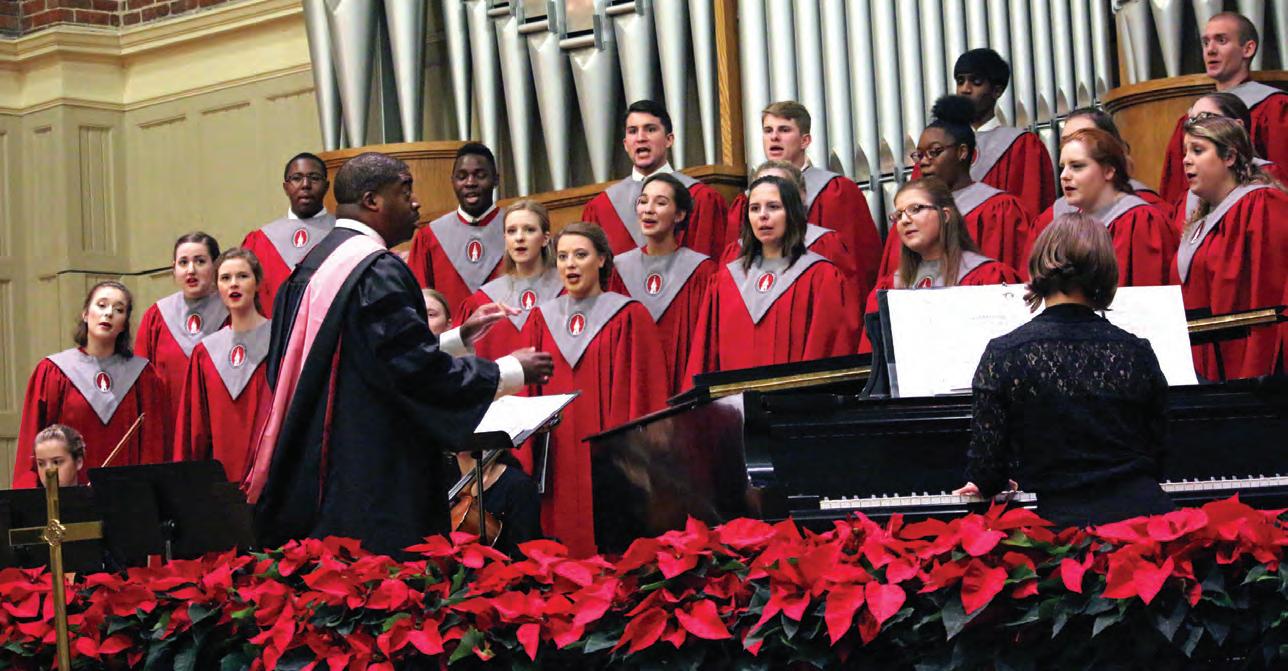














































































































































HU wwwhun M UNTING NTING ntingdoned MUSIC GDON DON USIC du/music COLLEG COLLEGGE E (Chor P–12 Music E Mus MAJO QU SC G ral) Education sic RS STUDEN ALIFIED OR BLE F A A A ARSHIP A HO USENERO L V IL U ntingdon.e LLEGE H CO THE HUN OI RCELEB TS PS V SCHOOL HIGH ONNTINGD S:ICE RATING ORCH m(Instru P–12 Music E 20 w LRA ental) ducation AUDITIO 019 Concert Choir ho participate in Teacher Brea Clin Dr. Kevi September LCHORA N n Sessions ak-Out nician n Fenton, 23–24, 2018 AL SFE CH TIV Ensem Various C Chamber Concert ENSEM F bles horal Choir Choir BLES 2019 ebruary 16, DATE choral www.hunt Septembe Deadline The cost is $4 include Lunch, t-sh 12 student , lfestival ingdon.edu/ r 10, 2018 to register: 40 per student d in fee hirt and music s per school onHuntingd For more infor itted to a policy a ge is comm n Colle du on e www.huntingd mation, see issible, arbitr rm gally impe t le gains uct.u/miscond discriminator asonable ary, or unre






 The Official Publication of the Alabama Music Educators Association
The Official Publication of the Alabama Music Educators Association






















 ocalist, Compose Leah Zeger — Violinist, V r
ocalist, Compose Leah Zeger — Violinist, V r


































































































































 by Michael Bird
by Michael Bird














 Dr. Matt Leder
Dr. Matt Leder




































































